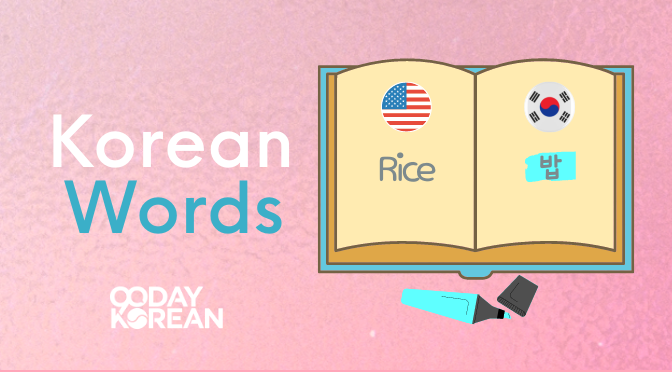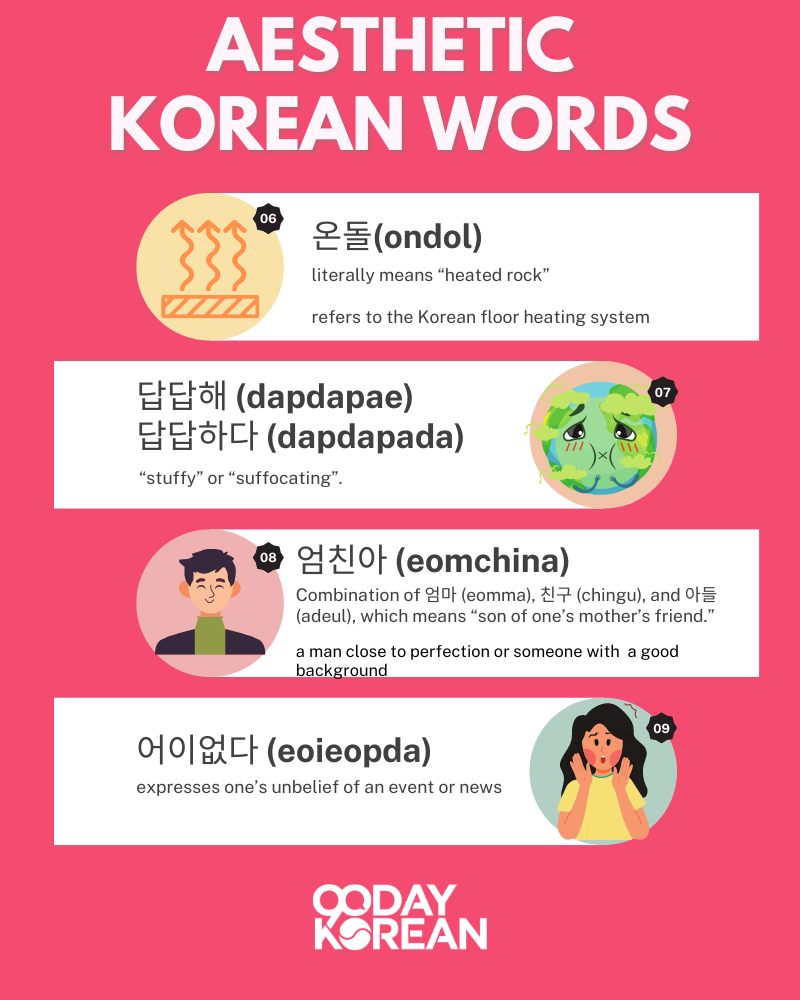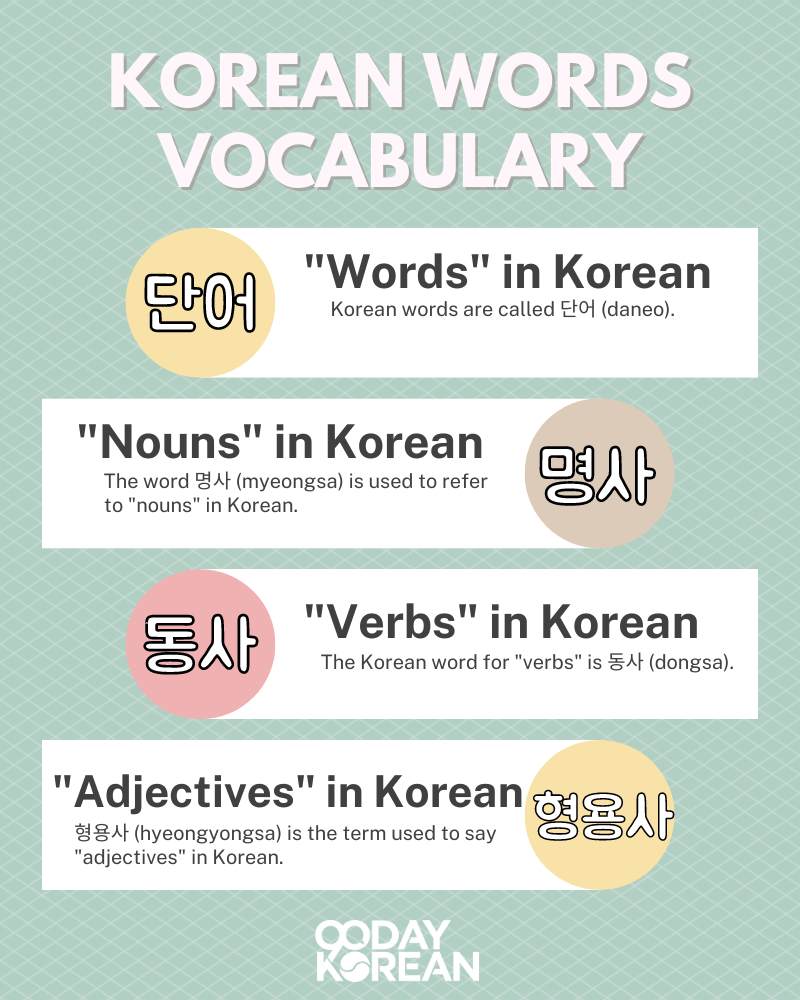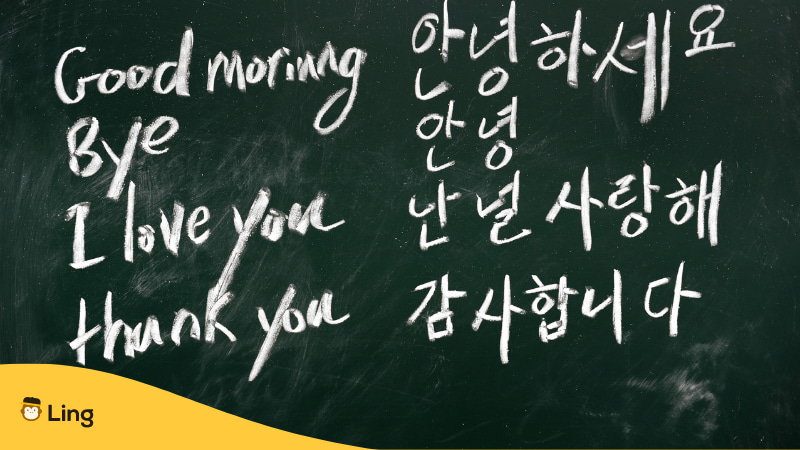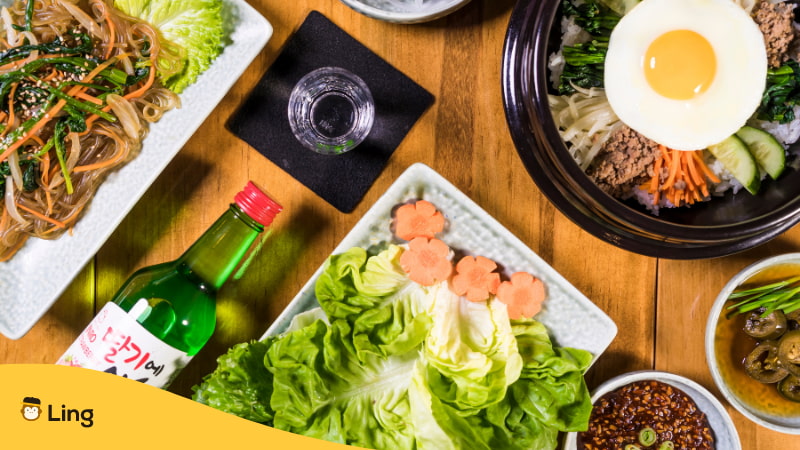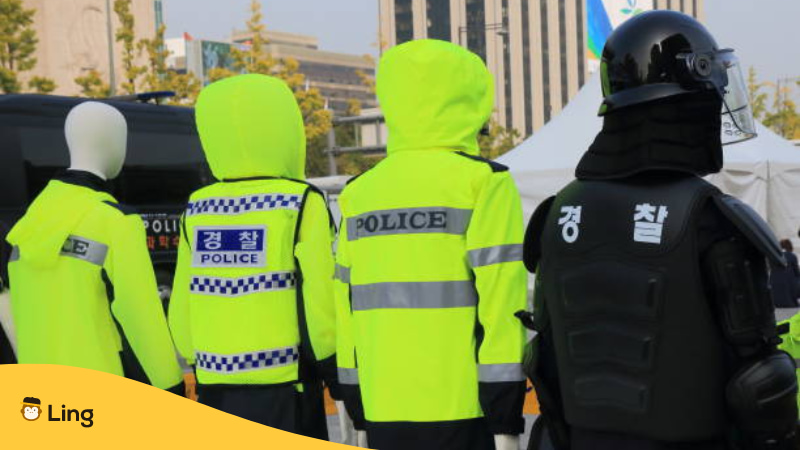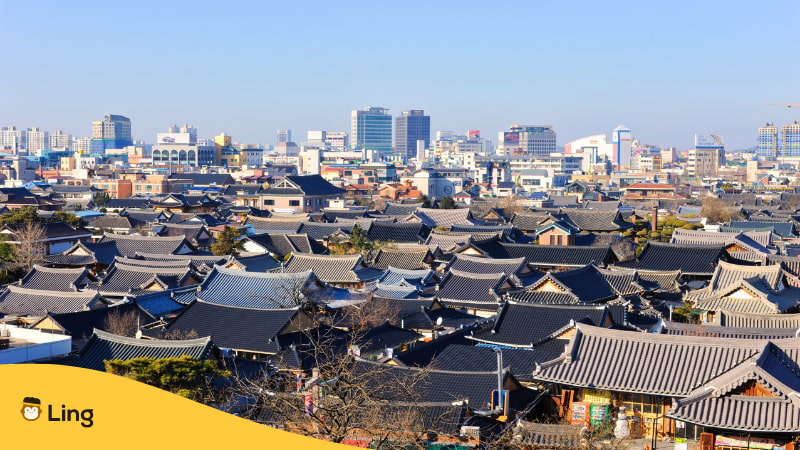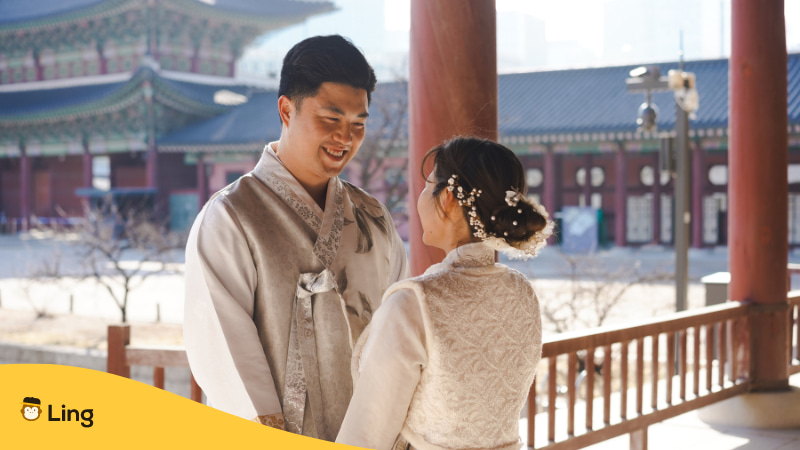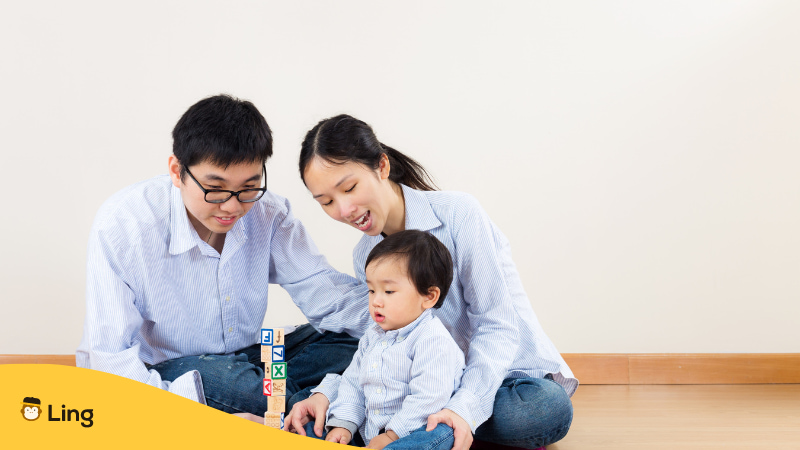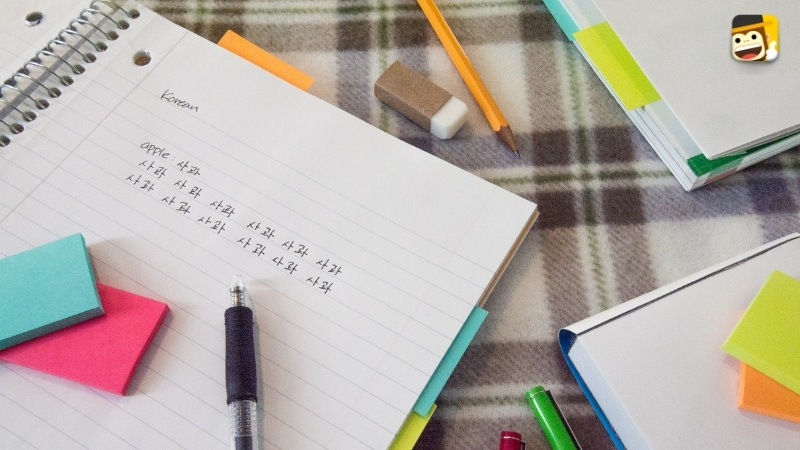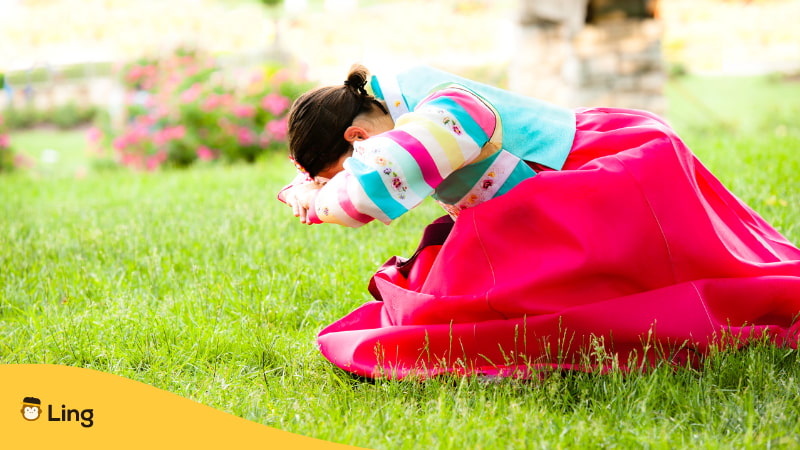Do you know the Korean words that will get you speaking the fastest?
Learn this basic Korean vocabulary, and you’ll be having conversations sooner than you think!
Here is a list of some of the common basic Korean words:
- Hello – 안녕하세요 (annyeonghaseyo)
- Please – 주세요 (juseyo)
- Sorry – 죄송합니다 (joesonghamnida)
- Thank you – 고맙습니다 (gomapseumnida)
- Yes – 네 (ne)
- No – 아니요 (aniyo)
- Maybe – 아마도 (amado)
- Help – 도와 주세요 (dowa juseyo)
- Excuse me – 저기요 (jeogiyo)
Below, we’ll cover more of the basic vocabulary that is commonly used in the language.
We have a downloadable PDF resource that contains the 100 basic Korean words that are used in everyday life in South Korea. The PDF also has a worksheet you can use to practice the words in the list. Download the resource here and use it to study the vocabulary:
After reading this, start looking out for the words and Korean phrases in your favorite K-Pop songs, in K-Dramas, at your neighborhood Korean restaurant, from your spouse/significant other, on your next trip to Seoul, or during daily life in Korea.
In the lists below, we’ve included audio of the Korean words to help you with your Korean listening and pronunciation skills. Just click the speaker icon next to each Korean vocabulary word and repeat the word. This will help you speak the Korean language properly. There are example sentences with English translations next to the words so you can see how they are commonly used in the language and daily conversations.
Contents
- 1 Korean Food Words
- 2 Korean Family & Relationship Words
- 3 Korean Basic Conversation Words
- 4 Korean Time Words
- 5 Korean Verbs
- 6 Korean Adjectives
- 7 Korean Adverbs
- 8 Easy Korean Words
- 9 Korean Words for Beginners
- 10 Beautiful Korean Words
- 11 Aesthetic Korean Words
- 11.1 눈치 (noonchi)
- 11.2 정 (jeong)
- 11.3 효 (hyo)
- 11.4 내숭 (naesung)
- 11.5 애교 (aegyo)
- 11.6 온돌(ondol)
- 11.7 답답해 (dapdapae) or 답답하다 (dapdapada)
- 11.8 엄친아 (eomchina)
- 11.9 어이없다 (eoieopda)
- 12 Korean Words Vocabulary
- 12.1 “Words” in Korean
- 12.2 “Nouns” in Korean
- 12.3 “Verbs” in Korean
- 12.4 “Adjectives” in Korean
- 12.5 English to Korean Words
- 12.6 Korean to English Words
- 13 Wrap Up
Many of these Korean words will be used in common everyday phrases, so it pays to learn them!
We’ve written them in both Hangeul (Korean Alphabet) and in romanized English. If you can’t read Hangeul yet, grab your free language guide here and be reading before your next meal.
Ready for some fun? Let’s do this!
If you’re planning on learning the Korean language, then you’re definitely going to want to know some basic Korean food vocabulary. With lots of tasty options and a huge variety, you’ll be happy you did!
Korean food plays a big part in Korean culture. Learning these simple Korean words will be helpful as you learn Korean and South Korean culture. It’ll be easy for you to talk about food in your everyday life in South Korea if you learn these basic Korean words. Below are the basic Korean words related to food.
Here are a few notes related to these Korean food words:
- If you want to order or ask for any of these items, add the phrase 주세요 (ju-se-yo) to any of these Korean words. This is one of the most useful phrases in the language. It means “please give me.”
- If you need to ask for water at a restaurant, a good phrase to say is 물 좀 주세요 (mul jom ju-se-yo).
- The word 밥 (bap) means “rice,” so you can use it for that exact meaning. It’s also used to reference food in general, as in a meal.
- One of the most common phrases you’ll hear in Korea is “밥 먹었어요?” (bap meogeosseoyo | did you eat?). In this case, the 밥 (bap) means “food,” not specifically rice. This is a great phrase to use when you meet your friends and want to use your language skills to ask about food plans.
- To order a beer, you can say 맥주 한 병 주세요 (maekju han byeong ju-se-yo), which means “Please give me 1 bottle of beer” in English. This is a really useful phrase when you meet with friends and want to order some drinks.
Korean Family & Relationship Words
These are fantastic Korean words to learn to help you understand everyday conversations. For sure, you’ll need these if you’re going to meet and talk to Koreans in their language!
You’ll also hear Korean say them often in K-Dramas and K-Pop lyrics. Get to recognize them in your favorite Korean shows and movies–or just listen for them in regular conversations.
They’re sure to show up, and you’ll be one step closer to understanding the Korean language!
Here are a few useful notes about Korean family and relationship words:
- You might hear the Korean phrase 우리 남편 (uri nampyeon | our husband). While the direct English language translation is “our husband,” it actually means “my husband.”
- The Korean word 우리(uri | we, our) is used quite commonly to talk about things that belong to the whole group, such as the phrases 우리 나라 (uri nara | our country), 우리 집 (uri jip | our house), and 우리 아내 (uri anae | our wife).
- Another commonly used Korean vocabulary word for “wife” is 부인 (buin). You can use the two interchangeably.
- The Korean word 친구 (chingu) means “friend,” but only same-age friends. If someone you know is a different age, then you would want to use the correct title.
- 가족 (gajok) means “family.” This Korean word will come up often in the language, so best to make sure you know how to talk about your family in Korean.
- You can use the Korean word 아빠 (appa) which is similar to the English word “dad.” You can also use the slightly more respectful/formal 아버지 (abeoji), which is similar to saying “father.”
- You can use the Korean word 엄마 (eomma) for “mom” or 어머니 (eomeoni) for “mother.” Both are commonly used terms in the language.
Korean Basic Conversation Words
This is the most common vocabulary you will hear in everyday language discussions and chats. These are great words to know, along with how to write your name in Korean and how to do a simple self-introduction.
Learn these key vocabulary, and you’ll start to get the gist of the language you hear in conversations, songs, movies, and dramas right away! These will be a great help in getting you to speak Korean.
Memorizing Korean words can be quite fun. If you want to know an easy way to remember 집 (jip), think of the vehicle brand Jeep. 집 (jip ) sounds just like Jeep, so you can imagine that there is a Jeep parked in front of your 집 (jip)!
Korean Time Words
Korea is an organized and fast-paced country, and we’re here to keep you on schedule! Use these Korean time words to talk about common events and when they happen.
After learning the words below, you can up your time game by learning the Korean numbers and start telling time in Korean. Having these two skills are very useful for learning the Korean language.
What is the difference between the Korean words 지금 (jigeum) and 이제 (ije)?
Korean Verbs
Did you know that you can make a sentence in Korean with just a single verb? It’s one of the great things about the simplicity of the Korean language! Learn these common Korean verbs first and be having conversations in Korean in no time. Here are the common Korean verbs that’ll help you speak Korean in daily conversations.
Once you know these Korean verbs, you can continue to make good progress in the language with Korean grammar and Korean particles.
Korean Adjectives
Korean adjectives help you a lot with your language learning as it enables you to describe objects, events, places, or feelings. As you’re starting out with your Korean language learning, you don’t need to know all of them. You just need to know the most common Korean words.
Here are the top adjective Korean words commonly used in everyday life. You will surely hear these as you learn the Korean language, so it’s good to add them to your vocabulary stack and get some practice with them.
Korean Adverbs
Another set of basic words for everyday life you need to know when you learn Korean is adverbs. These are words that will be helpful as you speak Korean. They’ll enable you to describe verbs and adjectives that’ll make you sound more like a native.
There are many adverbs in the Korean language, but we’ll list a few of the most common ones here. Below are some of the basic Korean adverbs.
Easy Korean Words
These are words that you can easily learn and remember. You may hear these words in Korean dramas, movies, variety shows, or K-pop idols’ live broadcasts.
Below are a few easy Korean words you can start learning:
| Korean Word | Meaning |
|---|---|
| (ye) | yes |
| (aniyo) | no |
| (uri) | we |
| (oneul) | today |
| (eoje) | yesterday |
| (naeil) | tomorrow |
| (bam) | night/evening |
| (achim) | morning |
| (wae) | why |
| (eonje) | when |
Korean Words for Beginners
The Korean words for beginners like you are words you can easily learn as they are often used in Korean dramas, movies, and other entertainment channels. They are very useful as they are often used in daily conversations.
Here’s a list of Korean words for beginners:
| Korean | Meaning |
|---|---|
| (annyeonghaseyo) | Hello |
| (kamsahamnida) | Thank you |
| (cheonmaneyo) | You’re welcome |
| (jamsimanyo) | Excuse me |
| (gwaenchanayo) | Okay |
| (joisonghamnida) | I’m sorry |
| (juseyo) | Please give me |
| (mollayo) | I don’t know |
| (arayo) | I know |
| (ihaehaeyo) | I understand |
| (joayo) | Good |
| (an joayo) | Not good |
Beautiful Korean Words
Beautiful Korean words are made up of words that are natively Korean. There are a lot of words in the Korean language that have Chinese origins. These words that have Chinese origins are oftentimes referred to as “loan words”.
But in the section below, you’ll learn about a few of the many beautiful Korean words which are natively Korean.
| Korean Word | Meaning |
|---|---|
| (haneul) | sky |
| (bi) | rain |
| (goyangi) | cat |
| (gangaji) | puppy |
| (saram) | person |
| (baram) | wind |
| (maeum) | mind/heart |
| (garam) | river |
| (bada) | ocean |
| (mireu) | dragon |
| (nareusha) | to fly |
| (narae) | wing |
| (nuri) | world |
| (nara) | nation |
Aesthetic Korean Words
As you learn Korean, you’ll discover that there are words in the language that don’t have a direct English translation. There might be words in English that can be used to explain them, but they don’t necessarily give the exact meaning.
Below is a list of these aesthetic Korean words. You might be surprised to know about them as you’ve already might have heard them from Korean dramas, movies, or even from your favorite K-pop idols.
눈치 (noonchi)
This word is translated as “sense” or “wits” in English. However, this Korean word is more than just sense and wits. It’s one’s ability to read, feel and understand people or situations without the need to verbally hear what it is.
A person who has 눈치 is able to react, do or say something simply by observing.
From this word comes from the expressions 눈치가 없다 and 눈치가 빠르다.
눈치가 없다 is used for someone who doesn’t know how to weigh or understand situations. Thus making them unable to respond, react or act accordingly.
눈치가 빠르다 is the opposite of 눈치가 없다. 눈치가 빠르다 is used for a person who’s quick to see things through. They easily understand people and situations.
정 (jeong)
정 (jeong) is a word that can talk about affection, attachment, feeling of connection. When Koreans use this word, they’re usually referring to the invisible bond that exists in Korean society.
효 (hyo)
This is a word that can be defined as “filial duty.” This can be used to talk about one’s devotion to one’s parents in taking care of them and taking responsibility for them until their old age.
내숭 (naesung)
내숭 is used to describe a person who is not real or in other words fake. This can be used for a person who hides their real identity or color.
애교 (aegyo)
There’s no exact one English word that can directly express the meaning of 애교 (aegyo). However, it may be defined as “acting cute” or “being lovely.”
온돌(ondol)
This word literally means “heated rock”. However, in practice, this word is used to refer to the Korean floor heating system.
답답해 (dapdapae) or 답답하다 (dapdapada)
These 2 expressions are translated as “stuffy” or “suffocating”. However, these 2 words, when in use can have a meaning other than “stuffy” or “suffocating”.
In usage, 답답해 or 답답하다 are used when someone feels “frustrated”. It can also be used when you get impatient, or feel irritated at someone’s slowness or narrow point of view.
엄친아 (eomchina)
This word is a combination of 3 Korean words which are 엄마, 친구, and 아들. These words combined mean “son of one’s mother’s friend”. However, this isn’t exactly what 엄친아 means.
엄친아 is used to describe someone, particularly a man who is close to perfection or someone who comes from or has a good background. He could be someone better than you.
For example, a man who is very talented, smart, handsome, and has a good educational background can be described as 엄친아.
The word used to describe women like this is 엄친딸.
어이없다 (eoieopda)
This word can express one’s unbelief of an event or news. It may also be used when you’re left speechless or have nothing to say or comment about because of an out-of-the-ordinary event.
Korean Words Vocabulary
Here are some useful vocabulary words in Korean. These are common Korean words you’ll often encounter as you learn the Korean language.
“Words” in Korean
Korean words are called 단어 (daneo). The word for vocabulary in Korean is 어휘 (eohwi) or 용어 (yongeo). There are special words in the Korean language for different types of vocabulary.
“Nouns” in Korean
The word 명사 (myeongsa) is used to talk about nouns in Korean. The different types of nouns are called 보통 명사 (botong myeongsa), 고유 명사 (goyu myeongsa) and 불가산 명사 (bulgasan myeongsa).
The Korean phrases 보통 명사 (botong myeongsa), 고유 명사 (goyu myeongsa), and 불가산 명사 (bulgasan myeongsa) are used for common nouns, proper nouns, and uncountable nouns respectively.
“Verbs” in Korean
동사 (dongsa) is the Korean word for verbs. The Korean phrases for regular and irregular verbs are 규칙동사 (gyuchik dongsa) and 불규칙 동사 (bulgyuchik dongsa).
“Adjectives” in Korean
The Korean word for adjectives is 형용사 (hyeongyongsa).
English to Korean Words
You can write English words in Korean by sounding them out slowly in English and then writing the equivalent sounds in Korean.
Korean to English Words
You can write Korean words in English by following the romanization rules.
Wrap Up
That’s a lot of words, but take your time in learning them. You can also find dictionary and translator app recommendations here if you prefer using these helpful tools!
If you want more goodness to supercharge your Korean language and culture skills, then check out our top resources here!

By
Last updated:
March 12, 2022
Looking to boost your Korean vocabulary? In this post, you’ll find the most useful Korean words and phrases.
You’ll learn an assortment of basic terms related to family, numbers, greetings, honorifics, questions, Korean holidays, days of the week, months of the year, common adjectives, verbs and even Korean slang.
And along the way, you’ll pick up loads of cultural insights, as well.
There’s a lot to digest here so let’s not dilly-dally and get right into it!
Contents
- Basic Korean Greetings and Courtesies
- Basic Korean Questions
- Essential Korean Honorifics
- Common Korean Adjectives
- Common Korean Verbs
- Korean Numbers
- Korean Days of the Week
- Korean Months of the Year
- Korean Holidays and Celebrations
- Korean Colors
- Korean Slang
Download:
This blog post is available as a convenient and portable PDF that you
can take anywhere.
Click here to get a copy. (Download)
Basic Korean Greetings and Courtesies
While Koreans aren’t generally your outgoing personalities who’ll casually strike up a conversation with strangers, they’re actually very warm and welcoming—especially when formally introduced by a common friend.
As a guest to the culture, you have to observe common courtesies. Learning a language becomes a lot easier when you have plenty of opportunities to practice with native speakers. And if you want Koreans to open up and interact with you, open them up by being nice and courteous, yourself. Pepper your communications with the following phrases:
안녕하세요 — “An-nyeong-ha-se-yo” (Hello/Goodbye )
Remember that there’s more to hello in Korean than just saying 안녕하세요: Learn the greeting and how to use it with this adorable song that teaches Korean greeting manners to children.
You can learn more about greetings in Korean by watching how native speakers use them. To find these words in use naturally, seek out programs that teach through immersion. The FluentU program, for example, lets you watch authentic Korean videos with interactive captions, and allows you to add words to vocabulary lists for later study.
Seeing these words in use will help you understand better when and how to actually use them yourself.
감사합니다 — “Kam-sa-ham-ni-da” (Thank you)
천만에요 — “Chun-mahn-eh-yo” (You’re welcome)
잠시만요 — “Jam-shi-man-yo” (Excuse me)
주세요 — “Ju-se-yo” (Give me)
죄송합니다 — “Chway-seong-ham-ni-da” (I’m sorry)
예 — “Ye” (Yes)
아니요 — “Aniyo” (No)
Koreans can sometimes be mistaken as nonchalant, or even arrogant. Well, they’re rarely that. They’re just really keeping to themselves, and also leaving you alone, or letting you be.
And don’t get your nose bent out of shape when you get shoved or pushed in a sea of people in a public setting. The concept of “personal space” is a lot smaller in Korea. You may not get the usual “personal bubble” (the comfortable physical distance between two people) that you’re used to in the West. Public spaces are considered “shared spaces.” But make no mistake, Koreans aren’t the touchy-feely types and are not too big on patting the back or shoulders. Also, avoid giving friendly hugs, especially when first meeting someone.
Basic Korean Questions
Questions and conversation starters are vitally important when learning a new language. For another top video from the FluentU Korean channel, check out the clip below.
You’ll learn 10 of the most common questions and conversation starters to spark up a discussion with anyone in Korean.
Korean is a melodic language that glides up and down in tone. To ask a question, it’s not even necessary to use question words like “what,” “where” or “who.” You just end the statement on a high note and it gets perceived as a question. Just as intonation goes up in English questions, it goes up in Korean, as well—perhaps even more so.
By elevating the pitch, a single word can be turned into a question. For example, 진짜 (“jinjja”) the Korean for “really,” can be turned into a question with a simple rise in intonation. It is, in fact, one of the most common expressions and is used to validate something that’s just been said. As in, “I just got promoted/won the lottery/got a new girlfriend.” “Really!?” “Jinjja!?”
That said, here are some of the question words you need to know:
누구? — “Noo-goo” (Who?)
뭐? — “Mwo” (What?)
언제? — “Uhn-jae” (When?)
어디? — “Uh-dee” (Where?)
어떻게? — “Uh-dduh-kah” (How?)
왜? — “Weh” (Why?)
어떻게 지내세요? — “Eotteoke jinaeseyo?” (How are you?)
이름이 뭐예요? — “Ireumi mwoyeyo?” (What’s your name?)
어디 출신이세요? — “Eodi chulsiniseyo?” (Where are you from?)
이거 뭐예요? — “Igeo mwoyeyo?” (What’s this?)
뭐라고 했어요? — “Mworago haesseoyo?” (What did you say?)
Korean Family Words
Korean culture is steeped in Confucian philosophy, and filial piety is one of its basic tenets. Family is big in the culture and absolute respect and consideration are given to elders. Grandpa and grandma can voice their strong opinions on matters such as your love life, the sorry state of your education or your “out-of-the-box” sense of fashion. Aunts and uncles, by virtue of them being older than you, can also easily put their two cents in.
You can say that the Korean family is both traditional and conservative. Unlike American families, you don’t really get to be on a first-name basis with your mom or dad, even when you get old enough to send them to a nursing home. (Also, adult children feel a strong responsibility to take care of aging parents.)
It used to be that wives did a disproportionate amount of household chores. But over time, just as women are proving themselves in the workforce, men are also increasingly becoming more involved in domestic affairs.
In general, Korea is adopting more Western virtues. Just as Korean culture is being appreciated all over the world, Korea is also looking to other cultures to add richness to its own. (Meanwhile, teenagers are headaches in any era or culture.)
Here’s some vocabulary related to the family:
가족 — “Gajok” (Family)
친척 — “Chincheok” (Relatives)
부모님 — “Boo-mo-nim” (Parents)
아버지 — “A-buh-ji” (Father)
어머니 — “Uh-muh-ni” (Mother)
남편 — “Nampyeon” (Husband)
아내 — “Anae” (Wife)
할아버지 — “Hal-ah-buh-ji” (Grandfather)
할머니 — “Hal-muh-ni” (Grandmother)
삼촌 — “Sam-chon” (Uncle)
고모 — “Sung-mo” (Aunt on father’s side)
이모 — “I-mo” (Aunt on mother’s side)
Koreans have specific terms for the different folks that occupy the different branches and levels of the family tree. For example, there are terms for people in your wife’s father’s side and different terms for people on her mother’s side.
Live in Korean has a chart to help you with this.
Essential Korean Honorifics
If you’re into watching Korean dramas, you may have already noticed how important hierarchy is in Korean society. Without understanding a single Korean word, you’d know who’s who in the scene simply by their non-verbal communication. (Who bows a little lower, who averts their eyes, who’s showing deference, etc.)
If age is just a number in other cultures, it’s a very important concept in Korean society. Age allows people to organize themselves and others in the social hierarchy. Two people’s relative places in the totem pole guide the type and nature of their interactions. In fact, don’t be slighted when you get asked about things like your age or salary. They’re just trying to learn more about you and determine how to properly address you.
There’s a premium placed on seniority in Korean culture and, in addition to age, one’s social status also has a very strong bearing in social interactions. Deference and respect are shown to (and expected by) elders, bosses, government officials, corporate bigwigs, etc.
It’s very difficult, for example, to voice opinions counter to those of your boss. This is probably true for most other cultures, but it’s more vivid in Korean culture.
Knowing all that, here are some honorifics that you can use to refer people above, beside and below you in the social ladder:
님 — “Nim”
“Nim”’ is used to speak formally to persons older than you. It’s usually used after professions, like teachers (선생님 — “Seon-saeng-nim”) or presidents/CEO’s (회장님 — “Hui-jang-nim”).
씨 — “Shi”
If “nim” is used for professions or titles, “shi” is used for specific names. It’s Korea’s version of the English “Mr.” or “Ms.” or the Japanese “san,” as in “Daniel-san.”
So if a person’s first name is 태원 (Tae-won), it becomes 태원씨 (Tae-won-shi). Always remember to attach the honorific after the first name, not the last name.
아저씨 — “Ajusshi”
This is given to middle-aged (40s to late 50s) men and is similar to the English “mister.”
아주머니 — “Ajumoni”
This one’s given to middle-aged women, a little bit more formal than 아줌마 (“Ajumma”), as a sign of respect for somebody older than you. Because this is the equivalent of the English “ma’am,” some might protest its application on them, saying, “Excuse me, I’m not as old as you think.”
오빠 — “Oppa”
Girls use this to refer to an “older brother.” But the meaning of “oppa” has evolved over time, now including older guys who are just friends. It can also now mean boyfriend. Watch any Korean drama and you’ll most probably hear “oppa” used this way.
형 — “Hyung”
This is what boys call guys who are older than them. It means “older brother” but its use has since been expanded to include guys who are your friends, but older. The emphasis is on the word “older” rather than on “brother.” School seniors are considered as “hyung” by the freshmen class.
언니 — “Unnie”
Girls call other girls who are older than them “unnie.” It means “older sister,” but can be used in a friendship setting.
누나 — “Noona”
This is the male counterpart to “unnie” and is how boys show deference and endearment for their older friends who are females.
동생 — “Dongsaeng”
If you’re an “oppa”/”hyung” or “unnie”/”noona,” the person calling you that is your “dongsaeng.” The term can be used for male and female friends younger than you.
Koreans take the idea of seniority, of being younger or older, very seriously. Many of them will not get into a romantic relationship with somebody because he or she thinks of the other as a “dongsaeng.”
선배 — “Sunbae”
In the context of work or school, “sunbae” are people who have seniority. Maybe they have more experience in the profession, have a higher rank or came to the company earlier than you. These people wield plenty of respect and influence in the organization.
후배 — “Hubae”
A “hubae” is a junior person in an organization. They’re younger, less experienced and are relatively new to the group. They’re expected to speak politely to their “sunbae.”
Depending on where a person is on the totem pole, he can be a “sunbae” for one and a “hubae” for another.
Common Korean Adjectives
“Knowing” Korean doesn’t mean that you know all the words, phrases and idioms. The fact is, even native speakers of any language don’t know many of the words in their own tongue. To know a language means knowing the most common, most practical words that could help you navigate interactions with native speakers.t
We work here with the “Pareto Principle,” or the “80/20 Rule” where just 20% of the language can get you through 80% of your interactions with native speakers. These aren’ exact figures, but the point is, you don’t have to cover every last Korean word or dive into esoteric vocabulary in order to learn Korean. Just practice the most common adjectives, verbs, adverbs, nouns, etc. and you’ll do reasonably well.
Here’s a list of the most common adjective pairs that could pop up in your conversations:
큰 — “Keun” (Big)
작은 — “Jageun” (Small)
늙은 — “Neulgeun” (Old)
새로운 — “Saeloun” (New)
이른 — “Ileun” (Early)
늦은 — “Neujeun” (Late)
긴 — “Gin” (Long)
짧은 — “Jjalbeun” (Short)
좁은 — “Jobeun” (Narrow)
넓은 — “Neolbeun” (Wide)
같은 — “Gateun” (Same)
다른 — “Daleun” (Different)
Common Korean Verbs
Here are a few common verbs that could come up in daily conversations:
먹다 — “Meokda” (Eat)
마시다 — “Masida” (Drink)
자다 — “Jada” (Sleep)
주다 — “Juda” (Give)
가다 — “Gada” (Go)
놀다 — “Nolda” (Play)
누르다 — “Nureuda” (Press)
달리다 — “Dallida” (Run)
쓰다 — “Sseuda” (Write)
읽다 — “Ilgda” (Read)
“500 Basic Korean Verbs” has more action words to add to your Korean.
Korean Numbers
Korea has two number systems, and they’re used for different purposes. The native Korean number system below is used when you want to count something, like “one apple,” “two bananas” and “10 fingers.” Age, which is very important in Korean society, uses this counting system. The number system only goes as high as “99.”
Here are the first 10 Korean counting numbers:
하나 — “Hana” (1)
둘 — “Dool” (2)
셋 — “Set” (3)
넷 — “Net” (4)
다섯 — “Dasut” (5)
여섯 — “Yusut” (6)
일곱 — “Eelgop” (7)
여덟 — “Yudulb” (8)
아홉 — “Ahop” (9)
열 — “Yul” (10)
The next number system, a Chinese (Sino) influenced one, is used when you want to use figures for things like telephone numbers, addresses, dates and money. Unlike the previous system that only goes as high as “99,” these numbers go to trillions and beyond. So let’s say you have trillions of apples—you’d switch to this system to count them.
Here are the first 10 Sino-Korean numbers:
일 — “Eel” (1)
이 — “Ee” (2)
삼 — “Sam” (3)
사 — “Sa” (4)
오 — “O” (5)
육 — “Yook” (6)
칠 — “Chil” (7)
팔 — “Pal” (8)
구 — “Goo” (9)
십 — “Ship” (10)
Korean Days of the Week
There’s just seven of them, so memorizing them shouldn’t take a week. (Plus, they all end in “-yo-il”). The names of the days have Chinese origins and taken from the names of the five elements in nature and two heavenly bodies—the sun and the moon.
월요일 — “Wur-yoil” (Monday)
화요일 — “Hwa-yoil” (Tuesday)
수요일 — “Soo-yoil” (Wednesday)
목요일 — “Mog-yoil” (Thursday)
금요일 — “Geum-yoil” (Friday)
토요일 — “To-yoil” (Saturday)
일요일 — “Ee-ryoil” (Sunday)
Korean Months of the Year
The Korean months of the year also have some Chinese origins. “Wol” is the Sino-Korean word for “month,” and it’s prefixed by the Sino-Korean numbers you learned previously:
1월 — “Irwol” (January)
2월 — “Iwol” (February)
3월 — “Samwol” (March)
4월 — “Sawol” (April)
5월 — “Owol” (May)
6월 — “Yuwol” (June)
7월 — “Chirwol” (July)
8월 — “Palwol” (August)
9월 — “Guwol” (September)
10월 — “Siwol” (October)
11월 — “Shipilwol” (November)
12월 — “Shipiwol” (December)
Korean Holidays and Celebrations
Koreans hold annual celebrations that reflect their history, values and beliefs as a nation. Here are some of them:
새해 — “Saehae” (New Year’s Day)
This takes place on January first and is typically celebrated like other countries around the globe: with lots of food, drinks, music and fireworks.
설날 — “Seolnal” (Lunar New Year)
“Seolnal” is more culturally significant for Korea—a celebration based on the lunar calendar which has only 354 days to the year. Celebrations follow a few weeks after “Sinjeong.” The Lunar New Year is usually a three-day affair—covering the day before “Seolnal,” the day itself, and the day after.
Koreans often go back to their hometowns bringing gifts for parents and paying respects to their ancestors. “Hanbok,” the traditional garb is worn on the day itself. Tables get loaded with food which almost always includes rice cake soup and fried pancakes.
In addition to the family catching up with the goings-on of each other’s lives, traditional games are played to while away the day.
삼일절 — “Samiljeol” (Independence Movement Day)
In the afternoon of March 1, 1919, Korean activists declared “everlasting liberty” from Japanese occupiers who controlled the Korean peninsula at that time. The independence document touted Korea’s 5,000-year-long history and their right to freely co-exist with all humankind.
어린이날 — “Eorininal” (Children’s Day)
Every Korean child is excited for the fifth of May celebrations. It’s like Christmas in May. They get their gifts they’ve been hinting for the longest time. There could also be money involved. Mom and dad also take them to amusement parks, zoos, malls and museums to give them the time of their lives.
부처님 오신 날 — “Bucheonnim Osinnal” (Buddha’s Birthday)
Buddhism is one of the major religions in Korea. It’s celebrated on the eighth day of the fourth month of the Lunar calendar.
현충일 — “Hyeonchung-il” (Memorial Day)
June 6 honors the ultimate sacrifice made by the men and women who fought in the Korean wars. The president leads the rites at the National Cemetery in Seoul. The flag is flown at half-mast and at 10 AM, sirens ring all across the country and followed by a minute of prayerful silence.
제헌절 — “Jeheonjeol” (Constitution Day)
A country cannot be strong without a codified system of laws. July 17, 1948 is hailed as the day when Korea’s fundamental law of the land was promulgated. Bad news though: the day is a working holiday. Awwww.
광복절 — “Gwangbokjeol” (Liberation Day)
Koreans raise the flag with a little bit more pride on this day. August 15 commemorates Korea’s liberation from Japan, after decades-long of struggle and turmoil. This is the day the empire of Japan unconditionally surrendered to the Allied forces in World War II.
추석 — “Chuseok” (Autumn Eve)
There’s American Thanksgiving, then there’s “Chuseok” or Korean Thanksgiving—a three-day celebration which happens around September or October. Koreans flock back to their hometowns and spend time with the family. Special food, like “songpyeon,” rice dough filled with chestnuts, red beans and sesame seeds, is prepared.
“Chuseok” literally means “Autumn eve.” It’s a harvest festival, an homage to Korea’s roots as an agricultural nation.
개천절 — “Gaecheonjeol” (National Foundation Day)
October 3 each year commemorates the mythical founding of the first Korean Kingdom by Dangun, known as the “Grandson of Heaven.” Legend has it that Dangun is the son of “Hwanung” who descended from heaven and landed on Baekdu Mountain.
The holiday is celebrated with big fireworks displays that are always a crowd-pleaser. If you want a prime viewing spot, make your way to Yeouido Han River Park ahead of the crowd.
한글날 — “Hangeulnal” (Hangul Day)
This is the only celebration of its kind, commemorating a writing system. “Hangul” came to replace the Chinese characters prevalent in the 1400’s. King Sejong the Great appointed a committee to create a writing system that can easily be used by his subjects. From that committee came forth “Hangul,” a fully-fledged alphabet and one of the most scientific writing systems known today.
October 9, “Hangul Day,” celebrates this unparalleled accomplishment that shone a bright light on Korea’s distinctiveness as a nation.
크리스마스 — “Keuliseumaseu” (Christmas)
Christianity is one of the big religions in Korea. Christmas is celebrated in Korea just as it’s celebrated around the world, with Christmas songs, presents and fine food.
Korean Colors
Just like in other cultures, colors are highly symbolic and have traditional meanings in Korean culture. White, black, red, blue and yellow are the five traditional colors of Korea. These colors are seen in the Korean flag, and are rich with history, religion and meaning:
흰색 — “Heuinsaek” (White)
Only the noble class and royalty used to be able to wear colored clothing. The masses, who couldn’t afford those expensive color dyes, wore white hanboks. And so the Koreans came to be known as “white-clad people.”
The color, which occupies the biggest real estate in the Korean flag, is also associated with purity, peace and patriotism.
검정색 — “Geomjeongsaek” (Black)
Black symbolizes death and winter. It also symbolizes the end of a cycle.
파란색 — “Paransaek” (Blue)
In the Korean flag, blue represents the “yin” component of the “Yin-yang.” It symbolizes feminine energy—cool and refreshing.
빨간색 — “Bbalgansaek” (Red)
Red represents fire. It signifies the masculine “yang” component of “Yin-yang”—creative, passionate and alive. Today, red is worn during sporting events to show team support.
노란색 — “Noransaek” (Yellow)
Yellow represents a complete balance of the Yin-yang forces. Yellow symbolizes the sun, the center of everything. And being the “center,” it also symbolizes the beginning or starting point of knowledge and wisdom.
초록색 — “Choroksaek” (Green)
Green symbolizes fertility, new beginnings and abundance. Traditionally, green used to be considered a variation of the color blue.
갈색 — “Galsaek” (Brown)
주황색 — “Juhwangsaek” (Orange)
분홍색 — “Bunhongsaek” (Pink)
보라색 — “Borasaek” (Purple)
Korean Slang
대박 — “Dae-bak” (Awesome!)
When something positive or good has just happened, you yell this in celebration. Say, you just passed a test or successfully flirted with your crush, you say, “Dae-bak!”
콜 — “Kol” (Sure!)
Poker players say “Call!” to signify that they’re still in the game. Koreans use it to affirm that they’re doing something. “Eat a whole pizza in a single episode of the ‘Big Bang Theory’?” “Kol!”
아싸 — “Ah-ssa!” (Yay!)
Like “dae-bak,” this one’s another celebratory expression. So be ready with “Ah-ssa” when something nice happens—like when you just got tickets to see your favorite K-pop group.
파이팅 — “Paiting!” (C’mon!)
“Fighting!” You’re egging somebody to do something (hopefully not something illegal). You’re bucking him up, assuring him, “You can do it!” “Go, go, go!”
And so we wrap up this one here. There’s a lot to absorb in this post, so keep on coming back to this blog to review.
‘Til the next one.
“Paiting!”
Download:
This blog post is available as a convenient and portable PDF that you
can take anywhere.
Click here to get a copy. (Download)
Basic words and phrases in the Korean language (한국어 / hangugeo) can be easily learned nowadays. It is one of the most popular languages among southeast Asian countries because of the prevalence of Korean culture through Korean popular posts, Korean drama/movies, Korean music, and even Korean food. Many people want to learn Korean to expand their vocabulary and understand how their favorite Korean actors and Kpop biases speak. Whatever the reason is, it is undeniable that the Korean language has taken a big step to know not just in Asia but all over the world.
Today, there are lots of people who speak English as their second language because it has been widely used all over the world, but learning to speak Korean will definitely step up your game. It will widen your vocabulary and give you a deeper understanding of Koreans. So, are you ready to learn new Korean words and Korean phrases? Let’s go! (가자! / gaja!)
Page Contents
- What Are The Top 10 Basic Words In Korean?
- Other Basic Korean Phrases And Words You Should Learn
- A List Of 365 Common Korean Words To Improve Your Vocabulary
- Korean Language That Reflects Korean Culture
- About The Korean Language
- Start Learning Korean Now!
What Are The Top 10 Basic Words In Korean?
If you are wondering which essential Korean words you should learn first, have a look at the list below:
- Yes: 네 (ne) / 예 (ye)
- No: 아니오 (a-ni-yo)
- Okay: 괜찮아요 (gwaen-chan-a-yo)
- Hello: 안녕하세요 (an-nyeong-ha-se-yo)
- Please (for requests): 주세요 (ju-se-yo)
- Thank you: 감사합니다 (gam-sa-ham-ni-da) / 고마워요 (go-ma-wo-yo)
- You’re welcome: 천만에요 (cheon-man-e-yo)
- Excuse me: 실례합니다 (sil-lye-ham-ni-da)
- Sorry: 미안합니다 (mi-an-ham-ni-da) / 미안해 (mi-an-he)
- Goodbye: 안녕히 계세요 (an-nyeong-hi-gye-se-yo)
Meanings And Sounds Of The Basic Korean Words And Phrases You Should Lean
There is a special reason why people want to learn Korean words and Korean phrases. People have different reasons why they want to learn this language. It can be because they are inspired by the Korean music and dramas they are listening to and watching.
It may also be a requirement for an elective subject in school. Most of all, people want to start learning Korean because they want to travel to Korea and start conversations with the locals.
Whatever the reason is, it is really commendable for you to start learning Korean, so here’s a list of Basic Words and Phrases in Korean for you to start with:
1. 네 (ne)
/ 예 (ye)
English Translation: Yes
네 (ne) is used the same way it is used in the English language. As a traveler, this is really essential, especially in airports, shopping, dining, and traveling around the country. You can also hear people say 예 (ye) to say “Yes” in Korean, which has the same meaning as 네(ne). But in some cases, older people might consider 예 (ye) a more polite way to say “Yes.”
2. 아니요 (a-ni-yo)
English Translation: No
No is also one of the basic but most important words to learn in Korean. It is as important as the word Yes because you will not say Yes all the time.
On the other hand, when you are in doubt or unsure about something, 아마도 / amado is the right word for you. Of course, there will be a lot of things that you won’t be so sure about when you begin to learn Korean.
3. 괜찮아요 (gwaen-chan-a-yo)
English Translation: Ok
The common way of agreeing is saying Ok (괜찮아요 / gwaenchanayo). This is just a word, but it is really important and useful in many different situations.
4. 안녕하세요 (an-nyeong-ha-se-yo)
English Translation: Hello
안녕하세요 (annyeonghaseyo) is one of the most common words in the Korean language you will hear anywhere. Koreans love to welcome people with a greeting. This is the easiest Korean greeting that you can use in many situations. This is also a great conversation starter and icebreaker when communicating with the locals.
5. 주세요 (ju-se-yo)
English Translation: Please
Koreans really value respect and politeness. It is clearly reflected in Koreans when you go to their country or even just watch their movies and dramas that is why the word Please (주세요 / juseyo) is used often. As a traveler, this is important to show politeness to the locals in different situations, such as dining in a restaurant and shopping.
6. 감사합니다 (gam-sa-ham-ni-da)
/ 고마워요 (go-ma-wo-yo)
English Translation: Thank you
Saying Thank you(감사합니다 / gamsahamnida) in Korean is really important, especially when you visit Korea. 감사합니다 (gamsahamnida) is used in formal conversations, and you could also hear 고마워요 (gomawoyo), which is used in casual conversations. This is also a common Korean phrase or expression that is really important in daily conversations.
We all know that saying Thank you is a sign of showing appreciation and gratitude to another person, which is very important in Koreans. There are a lot more Korean phrases that you can use to say Thank you, but this is the most common one you can use in both speaking and writing.
7. 천만에요 (cheon-man-e-yo)
English Translation: You’re welcome
You should also know how to respond when somebody expresses gratitude to you by simply just saying You’re welcome (천만에요 / cheonmaneyo) in Korean. This is also a sign of politeness toward other people. Korean phrases like this are really important to keep the conversation going and be nice.
8. 실례합니다 (sil-lye-ham-ni-da)
English Translation: Excuse me
There will also be times when you need to use the phrase Excuse me (실례합니다 / sillyehamnida). This phrase is used to apologize, but there are different usages for this phrase. One example is 저기요 (jeogiyo), which is used to get attention. Another example is 잠시만요 (jamsimanyo), which is used to pass someone.
9. 미안합니다 (mi-an-ham-ni-da)
/ 미안해 (mi-an-he)
English Translation: Sorry
Both Korean phrases have the same meaning, but they are used in different situations. 미안합니다 / (mianhamnida) is formal, and you could also hear 미안해 (mianhe), which is more casual. Saying sorry is a sign of humility and also respect.
10. 안녕히 계세요 (an-nyeong-hi-gye-se-yo)
English Translation: Goodbye
Knowing how to say Goodbye (안녕히 계세요 / annyeonghi gyeseyo) in Korean is also important, especially if you are a tourist. It is one of the most common Korean greetings, which is mostly used in daily conversations.
These 10 basic words and phrases in the Korean language are just the simplest and easiest that you can learn. As a person who doesn’t know how to speak Korean, these phrases and words are a good starting point in your journey in language learning. For people who speak English, learning Korean may be challenging, especially in written form, since it is complicated. But with a lot of practice and continuous reading of blogs like this, you will surely learn little by little.
Other Basic Korean Phrases And Words You Should Learn
Speaking Korean will require you to learn more vocabulary other than the 10 mentioned above. Now that you have learned the 10 basic words and phrases in the Korean language, let us learn more. Take note, we are only learning the basic words, phrases, and sentences, there are separate blog posts for other topics as well. Here is a list of additional Korean phrases and words to learn in different categories:
1. For Everyday Life Conversations
There are plenty of Korean phrases and vocabulary that are commonly used in everyday conversation. There are Koreans who speak English, but there are also those who don’t. Learning basic words and phrases in the Korean language, as well as sentences, will make it easier when you are talking to the locals. Here is a list of words and phrases that are used in everyday life:
| English Translation | Korean | Pronunciation |
| Good | 좋아요 |
joayo |
| Bad | 안 좋아요 |
an joayo |
| That’s ok | 괜찮아요 |
gwaenchanayo |
| Just a moment! | 잠깐만요! |
jamkkanmanyo! |
| I understand | 이해해요 |
ihaehaeyo |
| I don’t know | 몰라요 |
mollayo |
| I know | 알아요 |
arayo |
| Don’t worry! | 걱정 하지 마세요! |
geokjeong haji maseyo! |
| No problem! | 문제 없어요 |
munje eopseoyo |
| What is this? | 이게 뭐예요 |
ige mwoyeyo |
| My name is … | 제 이름은 … 입니다 |
je ireum-eun … imnida |
| It is nice to meet you! | 만나서 반가워요 |
mannaseo bangawoyo. |
| Do you speak English? | 영어 하실 줄 아세요? |
yeong eo hasil jul aseyo? |
| Do you speak Korean? | 한국말 하실 줄 아세요? |
hangungmal hasil jul aseyo? |
| I can speak a little Korean | 한국말을 조금 할 수 있어요 |
hangungmareul jogeum hal su isseoyo |
| I can’t speak Korean | 한국말을 못해요 |
hangungmareul motaeyo |
2. Korean Words For Shopping
Shopping is part of a great adventure in Korea. Even if you don’t plan to go to Korea, there may be times when you want to buy something in a Korean store. One of the reasons why people admire Koreans is the products they use in everyday life. Here are some words that may help your shopping experience easier:
| English Translation | Korean | Pronunciation | Sound |
| shopping | 쇼핑 | syoping | |
| How much is this? | 이거 얼마예요? | igeo eolmayeyo? | |
| Can I pay with a credit card? | 카드 돼요? | kadeu dwaeyo? | |
| What time do you close? | 몇시에 문 닫아요? | myeotsie mun dadayo? | |
| Please give me a discount | 좀 깎아 주세요 | jom kkakka juseyo | |
| Please give me a receipt | 영수증 주세요 | yeongsujeung juseyo | |
| Please give me a refund | 환불해 주세요 | hwanbulhae juseyo | |
| How much is the total? | 모두 얼마예요? | modu eolmayeyo? |
3. Basic Korean Words And Phrases About Food And Dining
Another reason why people love Korean culture is because of their food. If you want to eat in local restaurants or if someone invited you for a meal, these are some phrases you need to know as a beginner. Take note of the pronunciation of these Basic words and phrases in the Korean language because it is really important.
| English Translation | Korean | Pronunciation | Sound |
| Bon appétit | 맛있게 드세요 | masitge deuseyo | |
| Eat up! | 많이 먹어요 | mani meogeoyo | |
| It’s delicious! | 맛있어요! | masisseoyo! | |
| I’m thirsty | 목 말라요 | mok mallayo | |
| I want to drink | 마시고 싶어 | masigo sipeo | |
| It doesn’t taste good | 맛없어요 | mateopseoyo | |
| I’m hungry | 배고파요 | baegopayo | |
| Please give me a menu | 메뉴판 주세요 | menyupan juseyo | |
| Do you have vegetarian dishes? | 채식주의자용 식사 있어요? | chaesikjuuijayong siksa isseoyo? |
4. Essential Phrases About Travel And Directions In Korean
Traveling is really hard if it is your first time, and it is even harder when you don’t know how to speak their native language. Even if you are with your friends and you only know how to speak English, traveling will be hard for all of you. If you decide to Korea, try learning the following phrases that the native speakers use:
| English Translation | Korean | Pronunciation | Sound |
| Turn left | 왼쪽으로 가세요 | oenjjokeuro gaseyo | |
| Turn right | 오른쪽으로 가세요 | oreunjjokeuro gaseyo | |
| Go straight | 직진하세요 | jikjinhaseyo | |
| I’m lost | 길을 잃었어요 | gireul irreosseoyo | |
| How far is it from here? | 여기에서 얼마나 걸리는지 아세요? | yeogieseo eolmana geollineunji aseyo? | |
| How much is the bus fare? | 버스 요금 얼마예요? | beoseu yogeum eolmayeyo? | |
| Where does this bus go? | 이 버스는 어디로 가요? | i beoseuneun eodiro gayo? | |
| How much is a bus ticket to Seoul? | 서울에 가는 버스 표가 얼마예요? | seoure ganeun beoseu pyoga eolmayeyo? |
|
| I’m sorry, I’m not from around here | 미안하지만 저는 이 근처 사람이 아니예요 | mianhajiman jeoneun i geuncheo sarami aniyeyo |
5. Korean Phases About Clarification
Being a non-native speaker will really give you a hard time understanding conversations and interactions. So, it’s nice to learn some basic words and phrases in the Korean language that you can use to make things clear. Surely, Koreans will be kind enough to clarify things for you.
| English Translation | Korean | Pronunciation | Sound |
| Please say that one more time. | 다시 한 번 말해 주세요 | dasi han beon malhae juseyo | |
| Please speak slowly. | 천천히 말해 주세요 | cheoncheonhi malhae juseyo | |
| I don’t understand | 이해 못했어요 | ihae mothaesseoyo |
6. Words And Phrases About Emergency In Korean
Emergencies can happen anytime and anywhere. You never know when and where it will happen. You may feel comfortable if you always have a doctor like Kang Mo-Yeon (in Descendants of the Sun) or a responsive police officer like Choi Eun-Cheol (in Hometown Cha-cha-cha) by your side. But, if you don’t have people like them at all times, you must learn some basic words and phrases in Korean to be used for emergencies like the following:
| English Translation | Korean | Pronunciation | Sound |
| emergency | 비상 | bisang | |
| police | 경찰 | gyeongchal | |
| It’s my emergency phone number | 비상 전화번호예요 | bisang jeonhwabeonhoyeyo | |
| Fire! | 불이야 | buriya | |
| Be careful. | 조심하세요! | josimhaseyo! | |
| I’m scared. | 무서워요 | museowoyo | |
| Help me! | 도와주세요! | dowajuseyo! | |
| Call the police, please. | 경찰을 불러 주세요 | Gyeongchareul bulleo juseyo. | |
| Call an ambulance! | 구급차 불러요! | gugeupcha bulleoyo! | |
| Someone has stolen my bag. | 누군가 제 가방을 훔쳐갔어요 | nugun-ga je gabangeul humchyeogasseoyo |
7. Korean Phrases About Accommodation
Going to a place as wonderful as South Korea will bring you different sorts of adventures which can be tiring but fulfilling. One of the first things you’ll do when you arrive in Korea is to look for accommodation that is really budget-friendly but can still give you the Korean cultural experience. Learn these basic words and phrases in the Korean language that is related to accommodation to have smooth transactions.
| English Translation | Korean | Pronunciation | Sound |
| a hotel | 호텔 | hotel | |
| a room key | 방 열쇠 | bang yeolsoe | |
| to reserve | 예약하다 | yeyakada | |
| a single room | 싱글룸 | singgeullum | |
| check-in | 체크인 | chekeuin | |
| check-out | 체크아웃 | chekeuaut | |
| We want to stay here for two nights. | 우리는 여기에서 이틀 밤을 머물고 싶어요 | urineun yeogieseo iteul bameul meomulgo sipeoyo | |
| I want to reserve two rooms for four people. | 나는 4(네)명의 사람들을 위해 방 2(두)개를 예약하고 싶어요 | naneun 4(ne)myeongui saramdeureul wihae bang 2(du)gaereul yeyakago sipeoyo | |
| I want to reserve a single room for one night. | 나는 하룻밤 묵을 싱글룸을 예약하고 싶어요 | naneun harutbam mugeul singgeullumeul yeyakago sipeoyo | |
| Can I leave my room key at reception? | 제 방 열쇠를 안내 데스크에 맡겨도 되나요? | je bang yeolsoereul annae deseukeue matgyeo-do doenayo? | |
| Does the hotel provide Internet? | 그 호텔은 인터넷을 제공하나요? | geu hotereun inteoneseul jegonghanayo? | |
| I want to rest in my room. | 나는 내 방에서 쉬고 싶어요 | naneun nae bangeseo swigo sipeoyo |
8. Korean Words And Phrases Related To Love And Relationships
We cannot talk about basic words and phrases in the Korean language without some love and relationship phrases. After all, I bet one of the reasons why you’re here is because of your favorite Oppa and bias. And hey, pretty sure that the K-dramas never failed to make you fall in love or believe in true love, even in mermaids like “Legend of the Blue Sea” and aliens like “My Love from the Star.”
Falling in love with Koreans is not hard because, let’s admit it, what’s not to love about them? So, here are some basic words related to love and relationships:
| English Translation | Korean | Pronunciation | Sounds |
| love | 사랑 | sarang | |
| kiss | 키스 | kiseu | |
| date | 데이트 | de-i-teu | |
| friend | 친구 | chin-gu | |
| boyfriend | 남자친구 | namja-chin-gu | |
| girlfriend | 여자친구 | yeoja-chin-gu | |
| I miss you. | 보고 싶어 | bogo sipeo | |
| I love you. | 사랑해 | saranghae | |
| I like you. | 좋아해 | joahae | |
| I’ve got a crush on you. | 나는 너에게 반했어 | naneun neo-ege banhaesseo | |
| I want to see you. | 만나고 싶어 | mannago sipeo | |
| I’m yours | 나는 니꺼야 | naneun nikkeoya | |
| You are pretty! | 예쁘네요! | yeppeuneyo! | |
| You are so cute! | 너무 귀여워요! | neomu gwiyeowoyo! | |
| You are so sweet! | 정말 친절하네요! | jeongmal chinjeolhaneyo! | |
| It was love at first sight. | 첫눈에 반했어 | cheonnune banhaesseo | |
| You mean so much to me. | 당신은 나에게 무척 소중해요 | dangsineun naege mucheok sojunghaeyo | |
| Do you still not have a boyfriend? | 아직도 남자친구가 없어요? | ajikdo namjachinguga eopseoyo? |
9. Basic Words For Family In The Korean Language
Guided by the teachings of Confucianism, Korean families strictly value filial piety and respect for elders. Koreans are known to be family-oriented people. Family members are extremely devoted to one another. It is well-reflected in their K-dramas like “Reply 1988”. If you watched this K-drama, you could see the Korean culture in terms of family. Elders are well-respected. Parents are responsible for molding their children to be good and responsible citizens by providing them with education and teaching them Korean culture. Children are supposed to be obedient and respectful to their parents and pursue education to become successful in the future.
Here are some words and phrases related to the family that you should learn as a beginner:
| English Translation | Korean | Pronunciation | Sound |
| dad | 아빠 | appa | |
| mom | 엄마 | eomma | |
| son | 아들 | adeul | |
| daughter | 딸 | ttal | |
| grandfather (paternal) | 할아버지 | harabeoji | |
| grandfather (maternal) | 외할아버지 | oe harabeoji | |
| grandmother (paternal) | 할머니 | halmeoni | |
| grandmother (maternal) | 외할머니 | oe halmeoni | |
| husband | 남편 | nampyeon | |
| 아내 |
anae | wife | |
| 가족들과 함께 여행을 가요 |
gajokdeulgwa hamkke yeohaengeul gayo | I go on a trip with my family | |
| 우리 가족은 5(다섯)명이에요 |
uri gajogeun 5(daseot) myeongieyo | We are a family of five. | |
| 우리 아빠는 친절하세요 |
uri appaneyb chinjeolhaseyo | My dad is kind. |
10. Korean Verbs And Adjectives
Verbs and adjectives are essential parts of the sentence structure. If you know the basic verbs and adjectives, it will be easier for you to understand and write sentences in Korean. Remember, the Korean language is meant to be learned and understood easily. At first, it seems like it’s hard to learn, especially if you’re from a western country, but after learning the Korean alphabet, you’ll realize that it’s not hard to learn Korean. Here are some basic verbs and adjectives you’ll need to know.
| English Translation | Korean | Pronunciation | Sound |
| to eat | 먹다 | meokda | |
| to drink | 마시다 | masida | |
| to sleep | 자다 | jada | |
| to give | 주다 | juda | |
| to buy | 사다 | sada | |
| to see | 보다 | boda | |
| to laugh | 웃다 | utda | |
| to cry | 울다 | ulda | |
| to wear | 입다 | ipda | |
| to walk | 걷다 | geotda | |
| to meet | 만나다 | mannada | |
| to study | 공부하다 | gongbuhada | |
| to learn | 배우다 | baeuda | |
| to read | 읽다 | iktta | |
| to be good | 좋다 | jota | |
| to hate | 싫다 | silta | |
| to be easy | 쉽다 | swipda | |
| to be difficult | 어렵다 | eoryeopda | |
| to be clean | 깨끗하다 | kkaekkeuthada | |
| to be dirty | 더럽다 | deoreopda | |
| to be interesting | 재미있다 | jaemiitda | |
| to be boring | 재미없다 | jaemieopda | |
| to be hot | 덥다 | deopda | |
| to be cold | 춥다 | chupda |
11. Words About Time In Korean
One thing to learn about Koreans is they are really organized. Everything is fast-paced to keep productivity but remember, fast-paced doesn’t always compromise quality. They still care about details and quality of work. If you’re following a K-pop group, they spend time before releasing new songs, but they make sure that their comebacks are a blast.
| English Translation | Korean | Pronunciation | Sound |
| today | 오늘 | oneul | |
| yesterday | 어제 | eoje | |
| tomorrow | 내일 | naeil | |
| now | 지금 | jigeum | |
| time | 시간 | sigan |
12. Korean Slang Words
In learning basic words and phrases in the Korean language, we shouldn’t miss Korean slang words. If you have a strong grasp of this, understanding Korean jokes and watching K-dramas will be much easier. Also, if you start making friends, you will talk more casually. Usually, these are the terms that you’ll commonly use.
Korean slang words are not usually taught in the classroom. They are learned through interacting with other people and, of course, the internet.
| English Translation | Korean | Pronunciation | Sound |
| a lot of fun | 꿀잼 | kkuljaem | |
| not funny or boring | 노잼 | nojaem | |
| fighting! | 화이팅! | hwaiting! | |
| my heart skipped a beat |
심쿵 | simkung | |
| TBH (to be honest) | 솔까말 | solkkamal | |
| OMG, WTF | 헐 | heol | |
| charming act | 애교 | aegyo | |
| selfie | 셀카 | selka | |
| TGIF (literal Burning Friday or Golden Friday) | 불금 | bulgeum | |
| It’s lit | 오졌다 | ojyeotda | |
| badly | 더럽게 | deoreopge | |
| beginner level or noob | 쪼렙 | jjolep | |
| swag | 간지 | ganji | |
| mental breakdown | 멘붕 | menbung | |
| Chicken and beer, the perfect pairing | 치맥 | chimaek | |
| impulse shopping | 홧김비용 | hwatgimbiyong | |
| mask | 마스크 | maseukeu | |
| Fucking delicious | 존맛탱 | jonmattaeng (JMT) | |
| prettiest in the world | 세젤예 | sejelye | |
| IDK (short for 몰라, molla) | ㅁㄹ | m l | |
| sorry (short for 죄송합니다, joesonghamnida) | ㅈㅅ | j s | |
| ty (short for 감사합니다, gamsahamnida) | ㄱㅅ | g s |
13. K-Drama Words And Phrases
“Crash Landing On You,” “Reply 1988,” and “Goblin.” These are just three of the most iconic K-dramas that made history in the K-drama world. If you’re an OG K-drama fan, you have surely unconsciously picked up words commonly used in K-dramas. Wondering what it means? Check out these basic Korean phrases used in K-dramas.
| Korean | Pronunciation | English Translation |
| 누나 |
noona | used by males when referring to older female siblings/relatives/close friends; |
| 언니 |
eonni/unni | used by females when referring to older female siblings/relatives/close friends |
| 형 |
hyung/hyeong | used by males when referring to older male siblings/relatives/close friends |
| 오빠 |
oppa | used by females when referring to older male siblings/relatives/close friends/boyfriends; occasionally, idols/celebrities |
| 아저씨 |
ahjussi | middle-aged men/married men |
| 아줌마 |
ahjumma | middle-aged women/married women |
| 알았어 |
arasseo | Got it./Understood. |
| 안돼! |
andwae | No way! |
| 아이구 |
aigoo | Indicate a deep sigh, Expressing frustration or pity; show surprise (occasionally) |
| 배고파 |
b7aegopa | I am hungry. |
| 콜 |
kol | Call/Deal |
| 대박 |
daebak | Wow/Cool/Great |
| 잠깐만 |
jamkkanman | Just a sec/Wait a minute./Hold on. |
| 잘자 |
jalja | Good night./Sleep well. |
| 거짓말이야 |
geojitmariya | It’s a lie./Don’t lie. |
| 진짜? 정말? |
jinjja jeongmal |
Really? |
| 너 미쳤어? |
neo michyeosseo | Are you crazy? |
| 아싸! |
assa | Oh yeah |
| 제발 |
jebal | Please. |
| 어떡해? |
eotteokhae? | What to do? |
| 이렇게 |
ireohke | Like this. |
| 그래 |
geurae | Alright/ Sure/Okay |
| 괜찮아 |
gwaenchana | It’s fine./I’m okay. |
| 그럼 |
geureom | If so, then…/Of course. |
| 하지마 |
hajima | Don’t do it./Stop it. |
| 행복해 |
haengbokhae | I’m happy. |
| 어머 |
eomeo | Oh my gosh. |
| 빨리 |
palli | Hurry/Faster |
| 혹시 |
hokshi | Could it be…/By any chance…/Would it be possible if… |
| 여보세요 |
yeoboseyo | Hello (Used for answering a call ) |
| 예쁘다 |
yeppeuda | You’re pretty. |
| 약속해 |
yaksokhae | I Promise/Promise me |
| 선배 |
sunbae | used to address seniors |
| 후배 |
hoobae | used to address juniors |
| 세상에 |
sesange | In the world (literal); Oh my god!/My goodness! |
14. Korean Words For Music
Just recently, Lisa, the main dancer of the Korean girl group Blackpink, dropped her first-ever single entitled “Lalisa.” This song really made the whole world stop, even non-Koreans, because it broke two Guinness World Records. “Lalisa” hits 73.6 million views in its first 24 hours, breaking Taylor Swift’s “Me!” with 65.2 million. It also set a new record for a solo K-pop artist’s most-viewed YouTube music video in 24 hours which was formerly held by her bandmate Rosé.
BTS also set billboard records with their song “Dynamite” and is now concurring the world’s music industry. Just recently, they released their song with Coldplay entitled “My Universe.”
These are just two of the internationally recognized Korean groups that really made their way to represent Korea. It is no doubt that the Korean music industry is a global trend and has a huge fanbase in different parts of the world.
| English Translation | Korean | Pronunciation | Sound |
| K-pop | 케이팝 | keipap | |
| music | 음악 | eumak | |
| music industry | 음악 산업 | eumak saneop | |
| musical instrument | 악기 | akki | |
| music video | 뮤직 비디오 | myujik bidio | |
| classical music | 클래식 음악 | keullaesik eumak | |
| pop music | 가요 | gayo | |
| rap music | 랩 | raep | |
| jazz music | 재즈 음악 | jaejeu eumak | |
| singer | 가수 | gasu | |
| female singer | 여성 가수 | yeoseong gasu | |
| opera singer | 오페라 가수 | opera gasu | |
| band | 밴드 | baendeu | |
| pop culture | 대중문화 | daejungmunhwa | |
| What is your favorite K-pop group? | 어떤 케이팝 그룹을 가장 좋아해요? | Eotteon keipap geurubeul gajang joahaeyo? | |
| How long have you been listening to K-pop? | 케이팝을 들은지 얼마나 되었어요? | Keipabeul deureunji eolmana doeeosseoyo? |
A List Of 365 Common Korean Words To Improve Your Vocabulary
Below are some of the basic vocabulary of common Korean words about everyday life, essential words such as Korean family words, most typical greetings, basic medical terms, directions, and other terms for everyday life.
| No. | English Translation | Korean Word | Pronunciation |
| 1 | hello | 안녕하세요 | anyeong haseyo |
| 2 | excuse me? | 잠시만요 | jamshimanyo |
| 3 | please in a desperate way | 제발 | jebal |
| 4 | really? | 진짜? | jinjja |
| 5 | please | 주세요 | juseyo |
| 6 | sorry | 죄송합니다 | joesong hamnida |
| 7 | thank you | 고맙습니다 | gomap seumnida |
| 8 | yes | 네 | ne |
| 9 | no | 아니요 | aniyo |
| 10 | maybe | 아마도 | amado |
| 11 | help | 도와 주세요 | dowa juseyo |
| 12 | excuse me | 저기요 | jeogiyo |
| 13 | water | 물 | mul |
| 14 | vegetables | 야채 | yachae |
| 15 | fruit | 과일 | gwail |
| 16 | meat | 고기 | gogi |
| 17 | bread | 빵 | ppang |
| 18 | fish | 생선 | saengseon |
| 19 | coffee | 커피 | keopi |
| 20 | beer | 맥주 | maekju |
| 21 | soju | 소주 | soju |
| 22 | friend | 친구 | chingu |
| 23 | family | 가족 | gajok |
| 24 | old sister (if you are male) | 누나 | nuna |
| 25 | old sister (if you are female) | 언니 | eonni |
| 26 | old brother (if you are male) | 형 | hyeong |
| 27 | old brother (if you are female) | 오빠 | oppa |
| 28 | younger sibling | 동생 | dongsaeng |
| 29 | younger brother | 남동생 | nam dongsaeng |
| 30 | younger sister | 여동생 | yeo dongsaeng |
| 31 | dad | 아빠 | appa |
| 32 | father (formal) | 아버지 | abeoji |
| 33 | mom | 엄마 | eomma |
| 34 | mother (formal) | 어머니 | eo meo ni |
| 35 | son | 아들 | adeul |
| 36 | daughter | 딸 | ttal |
| 37 | twins | 쌍둥이 | ssangduni |
| 38 | triplets | 세 쌍둥이 | se-ssangdungi |
| 39 | uncle | 삼촌 | samchon |
| 40 | aunt | 이모 | imo |
| 41 | boyfriend | 남자 친구 | namja chingu |
| 42 | girlfriend | 여자 친구 | yeoja chingu |
| 43 | marriage | 결혼 | gyeolhon |
| 44 | husband | 남편 | nampyeon |
| 45 | wife | 아내 | anae |
| 46 | human | 사람 | saram |
| 47 | love | 사랑 | sarang |
| 48 | first love | 첫사랑 | cheot sarang |
| 49 | secret crush | 짝사랑 | jjak sarang |
| 50 | couple | 커플 | keopeul |
| 51 | drama | 드라마 | deurama |
| 52 | once | 한번 | hanbeon |
| 53 | twice | 두번 | dubeon |
| 54 | which | 어느 | eoneu |
| 55 | who | 누가 | nuga |
| 56 | where | 어디서 | eodiseo |
| 57 | how | 어떻게 | eoteohke |
| 58 | when | 언제 | eonje |
| 59 | what | 무엇을 | mueoseul |
| 60 | why | 왜 | wae |
| 61 | house | 집 | jip |
| 62 | country | 나라 | nara |
| 63 | job | 직업 | jigeop |
| 64 | you’re welcome | 천만에요 | cheonmaneyo |
| 65 | left | 왼쪽 | oen jjok |
| 66 | right | 오른쪽 | o reunjjok |
| 67 | it’s fine | 괜찮아 | gwaenchana |
| 68 | for a while | 이렇게 | ireoke |
| 69 | time | 시간 | sigan |
| 70 | now | 지금 | jigeum |
| 71 | today | 오늘 | o neul |
| 72 | yesterday | 어제 | eoje |
| 73 | tomorrow | 내일 | naeil |
| 74 | to go | 가다 | gada |
| 75 | to come | 오다 | oda |
| 76 | to have | 있다 | itda |
| 77 | to be | 이다 | ida |
| 78 | to eat | 먹다 | meokda |
| 79 | to drink | 마시다 | masida |
| 80 | to give | 주다 | juda |
| 81 | to see | 보다 | boda |
| 82 | to sleep | 자다 | jada |
| 83 | to wake up or get up | 일어나다 | ireonada |
| 84 | to buy | 사다 | sada |
| 85 | to write or to use | 쓰다 | sseuda |
| 86 | to laugh | 웃다 | utda |
| 87 | to cry | 울다 | ulda |
| 88 | to wear | 입다 | ipda |
| 89 | to walk | 걷다 | geotda |
| 90 | to read | 읽다 | ik tta |
| 91 | to learn | 배우다 | baeuda |
| 92 | to study | 공부하다 | gongbuhada |
| 93 | to meet | 만나다 | mannada |
| 94 | to like | 좋다 | jota |
| 95 | to hate | 싫다 | silta |
| 96 | to be hot | 덥다 | deopda |
| 97 | to be cold | 춥다 | chupda |
| 99 | to be sad | 슬프다 | seulpeuda |
| 100 | to be sick or in pain | 아프다 | apeuda |
| 101 | to be tired | 피곤하다 | pigonhada |
| 102 | to be interesting | 재미있다 | jaemiitda |
| 103 | to be boring | 재미없다 | jaemieopda |
| 104 | to be difficult | 어렵다 | eoryeopda |
| 105 | to be easy | 쉽다 | swipda |
| 106 | to be clean | 깨끗하다 | kkaekkeuthada |
| 107 | to be dirty | 더럽다 | deoreopda |
| 108 | to be fast | 빠르다 | ppareuda |
| 109 | to be slow | 느리다 | neurida |
| 110 | fast | 빨리 | ppalli |
| 111 | really | 정말 | jeongmal |
| 112 | slowly | 천천히 | cheoncheonhi |
| 113 | sometimes | 가끔 | gakkeum |
| 114 | seldom | 좀처럼 | jomcheoreom |
| 115 | never | 결코 | gyeolko |
| 116 | never | 절대 | jeoldae |
| 117 | skin | 피부, 살갗 | pibu/saklat |
| 118 | eye | 눈 | nun |
| 119 | body | 신체/몸 | sinche/mom |
| 120 | head | 머리 | meori |
| 121 | hair | 머리카락 | meorikarhak |
| 122 | face | 얼굴 | eolgul |
| 123 | dimple | 보조개 | bojoge |
| 124 | forehead | 이마 | ima |
| 125 | eyebrow | 눈썹 | nun sseop |
| 126 | shoulder | 어깨 | eokkae |
| 127 | eyelid | 눈꺼풀 | nun keopul |
| 128 | eyelashes | 속눈썹 | sok nun sseop |
| 129 | pupil | 눈동자 | nun dongja |
| 130 | ear | 귀 | gui |
| 131 | cheek | 볼 / 뺨 | bol/bbyam |
| 132 | nose | 코 | kho |
| 133 | nostrils | 콧구멍 | khot gumeong |
| 134 | mouth | 입 | ip |
| 135 | tooth | 이, 이빨 | i / ippal |
| 136 | lips | 입술 | ipsul |
| 137 | gum | 잇몸 | itmom |
| 138 | tongue | 혀 | hyeo |
| 139 | chin | 턱 | theok |
| 140 | neck | 목 | mok |
| 141 | throat | 목구멍, 목, 목이 | mok gumeong |
| 142 | body parts | 신체 부분 | sinche bubun |
| 143 | breast | 가슴 | gaseum |
| 144 | breast | 유방 | yubang |
| 145 | back | 등 | deung |
| 146 | abdomen | 배 | bae |
| 147 | navel | 배꼽 | bekkop |
| 148 | waist | 허리 | heori |
| 149 | buttocks | 엉덩이 | eongdeongi |
| 150 | vagina | 질 | jil |
| 151 | penis | 음경/자지 | umgyeong/ jaji |
| 152 | hand | 손 | son |
| 153 | arm | 팔 | pal |
| 154 | wrist | 팔목 | pal mok |
| 155 | wrist | 손목 | son mok |
| 156 | elbow | 팔꿈치 | pal kkumchi |
| 157 | palm (hand) | 손바닥 | son badak |
| 158 | fist | 주먹 | jumeok |
| 159 | finger | 손가락 | son garak |
| 160 | thumb | 엄지 | eomji |
| 161 | index finger | 검지 | geomji |
| 162 | ring finger | 약지 | yakji |
| 163 | fingernail | 손톱 | sontop |
| 164 | armpit | 겨드랑이 | khyeodeurangi |
| 165 | leg | 다리 | dari |
| 166 | thigh | 허벅지 | heobeokji |
| 167 | knee | 무릎 | mureup |
| 168 | foot | 발 | bal |
| 169 | claw | 발톱 | baltop |
| 170 | ankle | 발목 | balmok |
| 171 | top of the foot | 발등 | baldeung |
| 172 | heel | 뒤꿈치 | duiggumchi |
| 173 | toe | 발가락 | balgarak |
| 174 | brain | 뇌 | noi |
| 175 | heart | 심장 | simjang |
| 176 | artery | 혈관 | hyeolgwan |
| 177 | liver | 간 | gan |
| 178 | lungs | 폐 | pye |
| 179 | muscles | 근육 | guenyuk |
| 180 | bone | 뼈 | ppyeo |
| 181 | stomach | 위 | ui |
| 182 | appendix | 맹장 | maengjang |
| 183 | kidney | 콩팥 | kongpat |
| 184 | pancreas | 췌장 | chuejang |
| 185 | bowels | 장 | jang |
| 186 | womb | 자궁 | jagung |
| 187 | anus | 항문 | hangmun |
| 188 | doctor | 의사 | uisa |
| 189 | nurse | 간호사 | ganhosa |
| 190 | injection | 주사 | jusa |
| 191 | pharmacist | 약사 | yaksa |
| 192 | medicine | 약 | yak |
| 193 | cancer | 암 | aam |
| 194 | cough | 기침 | gichim |
| 195 | flu | 독감 | dokgam |
| 196 | tumor | 종양 | jongyang |
| 197 | vomiting | 구토 | guto |
| 198 | paralysis | 마비 | mabi |
| 199 | poisoning | 중독 | jungdok |
| 201 | toothache | 치통 | chitong |
| 202 | stomachache | 복통 | boktong |
| 203 | constipation | 변비 | byeonbi |
| 204 | jaundice | 황달 | hwangdal |
| 205 | runny nose | 콧물 | konmul |
| 206 | high fever | 고열 | goyeol |
| 207 | pregnancy | 임신 | imsin |
| 208 | childbirth | 출산 | chulsan |
| 209 | abortion | 낙태 | naktae |
| 210 | operation | 수술 | susul |
| 211 | hospitalization | 입원 | ibwon |
| 212 | hospital discharge | 퇴원 | toewon |
| 213 | diabetes | 당뇨병 | dangnyo |
| 214 | sunstroke | 일사병 | ilsabyeong |
| 215 | gastric ulcer | 위궤양 | wigweyang |
| 216 | syndrome | 증후군 | jeunghugun |
| 217 | high blood pressure | 고혈압 | gohyeorap |
| 218 | low blood pressure | 저혈압 | jeohyeorap |
| 219 | malnutrition | 영양실조 | yeongyangsiljo |
| 220 | death | 사망, 임종 | samang, imjong |
| 221 | sickness | 병 | byeong |
| 222 | prescription | 처방 | cheobang |
| 223 | dermatology | 피부과 | pibugwa |
| 224 | paediatrics | 소아과 | soagwa |
| 225 | ultrasound | 초음파 | choeumpa |
| 226 | neurology | 신경과 | singyeonggwa |
| 227 | consultation room | 진료실 | jillyosil |
| 228 | emergency room | 응급실 | eunggeupsil |
| 229 | plastic surgery | 성형외과 | seonghyeongoegwa |
| 230 | apple | 사과 | sagwa |
| 231 | apricot | 살구 | salgu |
| 232 | asparagus | 아스파라거스 | asupharageoosu |
| 233 | aubergine | 가지 | khaji |
| 234 | avocado | 아보카도 | abokado |
| 235 | baked beans | 찐 콩 | jjin khong |
| 236 | banana | 바나나 | banana |
| 237 | beansprouts | 콩나물 | khong-namul |
| 238 | beetroot | 홍당무 | hong-dangmu |
| 239 | blackberry | 블랙베리 | bullek-beri |
| 240 | blackcurrant | 블랙커런트 | bullek-kharanthu |
| 241 | blueberry | 블루베리 | bulluberi |
| 242 | broccoli | 브로콜리 | burokholli |
| 243 | brussels sprouts | 양배추 | yang-baechu |
| 244 | a bunch of bananas | 바나나 한 송이 | banana han songi |
| 245 | a bunch of grapes | 포도 한 송이 | phodo han songi |
| 246 | cabbage | 배추 | baechu |
| 247 | carrot | 당근 | dang-geun |
| 248 | cauliflower | 꽃양배추 | kot yang baechu |
| 249 | celery | 샐러리 | selleori |
| 250 | cherry | 체리 | cheri |
| 251 | courgette | 애호박 | ae-hobak |
| 252 | cucumber | 오이 | oi |
| 253 | fig | 무화과 | muhwagwa |
| 254 | French bean | 프렌치 콩 | furenchi khong |
| 255 | garlic | 마늘 | maneul |
| 256 | ginger | 생강 | saeng-gang |
| 257 | gooseberry | 구스베리 | gusuberi |
| 258 | grape | 포도 | phodo |
| 259 | grapefruit | 자몽 | jamong |
| 260 | kidney beans | 강낭콩 | gangnang-khong |
| 261 | kiwi | 키위 | khiwi |
| 262 | leek | 대파 | daepa |
| 263 | lemon | 레몬 | lemon |
| 264 | lettuce | 양상추 | yangsangchu |
| 265 | lime | 라임 | laim |
| 266 | mango | 망고 | mango |
| 267 | melon | 멜론 | mellon |
| 268 | mushroom | 버섯 | beoseot |
| 269 | onion | 양파 | yangpa |
| 270 | orange | 오렌지 | orenji |
| 271 | peach | 복숭아 | boksunga |
| 272 | pear | 배 | bae |
| 273 | peas | 콩 | khong |
| 274 | guava | 구아바 | guaba |
| 275 | pineapple | 파인애플 | painaepeul |
| 276 | plum | 자두 | jadu |
| 277 | pomegranate | 석류 | seokryu |
| 278 | potato | 감자 | gamja |
| 279 | pumpkin | 호박 | hobak |
| 280 | radish | 무 | mu |
| 281 | raspberry | 라즈베리 | rajuberi |
| 282 | soup | 수프 | supeu |
| 283 | spinach | 시금치 | sigeumchi |
| 284 | spring onion | 파 | pa |
| 285 | squash | 호박 | hobak |
| 286 | strawberry | 딸기 | ttalgi |
| 287 | sweet potato | 고구마 | goguma |
| 288 | corn / sweetcorn | 옥수수 | oksusu |
| 289 | tinned tomatoes | 토마토 통조림 | thomatho thong-jorim |
| 290 | tomato | 토마토 | thomatho |
| 291 | turnip | 순무 | sunmu |
| 292 | Persimmon | 감 | kham |
| 293 | Mustard | 갓 | khat |
| 294 | mandarin | 귤 | khyul |
| 295 | cauliflower | 꽃양배추 | kot yangbaechu |
| 296 | rice field | 논 | non |
| 297 | soybean | 대두 | daedu |
| 298 | bellflower | 도라지 | doraji |
| 299 | wheat | 밀 | mil |
| 300 | chestnut | 밤 | bam |
| 302 | leek | 부추 | buchu |
| 303 | barley | 보리 | bori |
| 304 | watermelon | 수박 | subak |
| 305 | citron | 유자 | yuja |
| 306 | plum | 자두, 매실 | jadu,maesil |
| 307 | (musk) melon | 참외 | chamwei |
| 308 | fafaya | 파파야 | papaya |
| 309 | red bean | 팥 | pat |
| 310 | green pepper | 풋고추 | put-gochu |
| 311 | brown rice | 현미 | hyunmi |
| 312 | carrot | 당근 | danggeun |
| 313 | rye | 호밀 | homil |
| 314 | gingko nut | 은행 | unhaeng |
| 315 | gluten | 찹쌀 | chapssal |
| 316 | green (unripe) fruit | 선 과일 | seon-gwail |
| 317 | orchard | 과수원 | gwasuwon |
| 318 | baguette | 바케뜨 | bakhetu |
| 319 | baking powder | 제빵 가루 | jepang garu |
| 320 | blue cheese | 파란색 치즈 | paransaek chiju |
| 321 | bread rolls | 롤빵 | rol-pang |
| 322 | brown bread | 갈색빵 | galsek-pang |
| 323 | brown sugar | 갈색 설탕 | galsek seolthang |
| 324 | butter | 버터 | ba-theo |
| 325 | cake | 케이크 | kheikhu |
| 326 | cooking oil | 식용유 | sikyongyu |
| 327 | corn flour | 옥수수 가루 | oksusu garu |
| 328 | cottage cheese | 코티지 치즈 | khotiji chiju |
| 329 | cream | 크림 | khurim |
| 330 | dates | 대추 | daechu |
| 331 | dried apricots | 건살구 | geon sal gu |
| 332 | eggs | 달걀 | dalgyal |
| 333 | full-fat milk | 고지방 우유 | gojibang wuyu |
| 334 | garlic bread | 마늘빵 | maneul pang |
| 335 | goats cheese | 염소젖 치즈 | yeomsojeot chiju |
| 336 | icing sugar | 아이싱 설탕 | aising seolthang |
| 337 | milk | 우유 | wuyu |
| 338 | olive oil | 올리브오일 | ollibu oil |
| 339 | pastry | 패스트리 | paeseuteuri |
| 340 | plain flour | 일반 밀가루 | ilban milgaru |
| 341 | raisins | 건포도 | geonphodo |
| 342 | sponge cake | 스폰지 케이크 | suphonji kheikhu |
| 343 | sugar | 설탕 | seolthang |
| 344 | white bread | 흰빵 | hwin pang |
| 345 | yeast | 효모 | hyomo |
| 346 | yoghurt | 요구르트 | yoguruthu |
| 347 | chilli powder | 고춧가루 | gochu garu |
| 348 | cinnamon | 계피 | gyepi |
| 349 | curry powder | 카레 가루 | khare garu |
| 350 | paprika | 파프리카 | pupeurikha |
| 351 | saffron | 사프란 | sapeuran |
| 352 | organic | 유기농 | yuginong |
| 353 | ketchup | 케첩 | khecheop |
| 354 | breakfast cereal | 아침 시리얼 | achim sirial |
| 355 | cornflakes | 콘프레이크 | khon pureikhu |
| 356 | honey | 꿀 | kkul |
| 357 | jam | 잼 | jaem |
| 358 | noodles | 면 | myeon |
| 359 | pasta | 파스타 | pasutha |
| 360 | pizza | 피자 | pija |
| 361 | porridge | 죽 | juk |
| 362 | rice | 쌀 | ssal |
| 363 | spaghetti | 스파게티 | seuphagethi |
| 364 | toast | 토스트 | thosuthu |
| 365 | Instant Noodles | 라면 | ramyeon |
Korean Language That Reflects Korean Culture
Whenever you hear the word or phrase that Korean people speak or see their expressions when you watch their different dramas on the television or on your phone, it becomes more and more familiar to you. By listening to native Korean speakers, you are already making a lot of effort to remember these basic words and phrases!
Learning about Korean culture is necessary because this will widen your perspective on learning the Korean language itself. When you observe Korean culture, you will recognize the meaning behind their language, words, phrases, sentences, and vocabulary in terms of speaking.
The common Korean vocabulary words that reflect Korean culture are the following:
- 친구 — “Chingu” (Friend) — This word has a different usage in English because Koreans generally use this word of the same age.
- 사랑 — “Sarang” (Love) — This is a Korean word for love. Japanese also have this word with the same meaning.
- 썸타다 — “Sseom-Ta-Da” (Mutual Understanding/Something’s going on) — This basic Korean phrase came from the English word ‘something’ or ‘something’s going’ on in terms of dating and ‘ta-da’ is an expression of ‘go-along’ if the dating couple will move to a more serious relationship.
- 애교 — “Aegyo” (Charming act) — This word is a trend right now in Korea. Mostly, women and even men do this charming and adorable act to look sweet to people. They often do the ‘aegyo’ when they take a ‘selka’ on their phones.
- 셀카 — “Selka” (Selfie) — From the English word ‘selfie’. Most Korean artists love to take pictures. Coz why not? Korean glass skin is worth showing off.
- 미안해 — “Mianhae” (I’m sorry) — This is an informal way to speak ‘I’m sorry’ in Korean. You always hear this Korean word, mostly in Kpop songs. In addition, Koreans are polite, especially the youngsters.
- 물 — “mul” (water) — This is the most commonly used noun in South Korea, as you probably hear in many K-dramas when drinking soju or eating moekbang.
- 밥 — “bap” (rice) — It’s not only the Philippines and Japan who love to eat rice, but also Korea. The rice that they eat was often wrapped in different types of leaves, together with meat or fish.
- 고기 — “gogi” (meat) — Koreans love meat, most especially grilled pork belly, which is also known as ‘samgyeop-sal’ with different ingredients. This is commonly eaten by a Korean family.
- 소주 — “soju” (clear liquor) — This is the most popular liquor in Korea. In Korean culture, drinking alcohol like soju, rice wine, and other alcohol is a big part of the lives of Korean family.
- 지금 — “jigeum” (now) — We frequently hear this word from our favorite Kpop groups whenever they have interviews, or sometimes in the daily conversations of your favorite Korean actors or artists in a variety show. This literally means ‘now’ or ‘at this moment’.
- 괜찮아요 — “gwaenchanayo” (That’s okay) — Most Koreans are cheerful and also compassionate people. In other words, you probably hear this Korean word whenever there’s an unexpected scenario in a Korean drama.
- 잘 자요 — “jal jayo” (Goodnight) — Although some Koreans use the English term ‘goodnight,’ most of the songs we hear from our favorite Kpop groups use ‘jal jayo.’ See? Through listening to their songs, we can learn basic Korean phrases, and understand some of the common Korean words in just a moment.
- 잠깐만요! — “jamkkannmanyo!” (Just a moment! / Wait!) — This expression from the most common Korean words is generally formally used in everyday life.
- 다 같이 — “da gachi” (All together) — You probably heard it right? This Korean word is usually heard when you watch a concert from your favorite Kpop group in initiating the fans to sing along with them.
- 이게 뭐예요 — “ige mwoyeyo” (What is this?) — This is also an expression from the most common Korean words, and it is also mainly used in everyday life in an informal manner, most especially when you are talking with your close friends or relatives.
- 좋아요 — “joayo” (Good) — This is also one of the most common Korean words that are being used a lot. You can hear this through different Korean vloggers who want different viewers to subscribe and like ‘joayo’ their vlogs.
Learn these cultural terms and you will be one step ahead!
About The Korean Language
Now that you’ve learned a few important words in Korean, there’s still a long way to go. If you are new to the language and are interested in learning even more details about this fantastic language, read this helpful information and take note!
Korean is spoken in North and South Korea, China (mainly provinces bordering North Korea), Japan, and Russia.
Korean is also spoken in other large communities around the world such as the US (most from New York), Singapore, Thai, Guam, and Paraguay. The number of Korean speakers continues to increase because there are some countries like the Philippines, where the Korean language is taught as an elective course.
Affiliation
The most known origin of the Korean language is the Altaic language family of central Asia, including Turkish, Mongolian, and the Tungusic languages of Siberia. Other linguists also argue that Korean belongs to the Austronesian language family.
Because of the long history between Chinese and Japanese, determining their linguistic affiliation is really complicated. Some also considered the Korean language as isolated. Whatever its origin may be, it gave birth to an amazing language called Korean.
Dialects
We all know that the whole country of Korea is divided into two – The Democratic People’s Republic of Korea (North Korea) and the Republic of Korea (South Korea). The Ancient Korean language was divided into many dialects, but naturally unified during the Unified Silla period.
There are two standard varieties of Modern Korean. Both dialects are distinguished and regulated by the national language policy of the country. Most of these dialects are mutually intelligible.
- Seoul Dialect – The standard dialect of South Korea. There are also regional dialects such as Kyeonsang, Chungchong, Jeolla, and Jeju Island.
- P’yŏngyang Dialect – This is the standard dialect of North Korea. The regional dialects include Hamkyeong, Pyeongan, and Hwanghae.
Start Learning Korean Now!
Learning basic words and phrases in the Korean Language will definitely help survive. You will hear a lot of phrases and words that you don’t even understand, and it will make it hard for you to have good communication with the locals. Of course, you won’t always have the opportunity to check your dictionaries or some free PDF files saved on your cellphone to compose what you want to say.
If you want to learn more Korean words, phrases, and sentences, Ling app will help you achieve your goals. Through the Ling app, you will be able to hear the pronunciation of each word. This will help you learn to speak the language accurately.
Ling app will provide fun and engaging lessons that will surely make your language learning experience exciting and meaningful. These lessons will help you learn how to speak and write in Korean.
Through Ling app, you don’t have to attend any class on a given schedule because you can learn with just your phone or computer during your free time. Learning a language will be a lot easier and more fun. What are you waiting for? Download the Ling app on the Play Store or App Store and start learning Korean now!

Once you learn these 50 basic Korean words you’ll be surprised just how fast you can start speaking in Korean! If you’re a beginner Korean language learner, after learning how to read the Korean alphabet the next thing you should learn is some basic Korean vocabulary.
Not only will this help you practice reading Korean words, but it will also help you to start speaking in Korean. Below you’ll find 50 common and basic Korean words for beginners. To help you learn these words, each of the Korean words below is written in Hangul (Korean characters) with English romanization and includes the English meaning. You’ll also be able to download a free PDF of these Korean words so you can study them at your own pace. Let’s get started.
| Korean Word | Pronunciation | English |
|---|---|---|
| 안녕하세요 | [an-nyeong-ha-se-yo] | hello |
| 고맙습니다 | [go-map-seum-ni-da] | thank you |
| 네 | [ne] | yes |
| 아니요 | [a-ni-yo] | no |
| 아마도 | [a-ma-do] | maybe |
| 주세요 | [ju-se-yo] | please/please give me |
| 죄송합니다 | [joe-song-ham-ni-da] | sorry |
| 안녕히 가세요 | [an-nyeong-hi ga-se-yo] | goodbye (when other person leaving) |
| 안녕히 계세요 | [an-nyeong-hi gye-se-yo] | goodbye (when you are leaving) |
| 하다 | [ha-da] | to do |
| 먹다 | [meok-da] | to eat |
| 가다 | [ga-da] | to go |
| 오다 | [o-da] | to come |
| 보다 | [bo-da] | to see |
| 아침 | [a-chim] | morning/breakfast |
| 점심 | [jeom-sim] | lunch |
| 저녁 | [jeo-nyeok] | evening/dinner |
| 밤 | [bam] | night |
| 이름 | [i-reum] | name |
| 가족 | [ga-jok] | family |
| 공원 | [gong-won] | park |
| 은행 | [eun-haeng] | bank |
| 편의점 | [pyeo-ni-jeom] | convenience store |
| 버스 | [beo-seu] | bus |
| 차 | [cha] | car |
| 기차 | [gi-cha] | train |
| 비행기 | [bi-haeng-gi] | airplane |
| 지하철 | [ji-ha-cheol] | subway |
| 식당 | [sik-dang] | restaurant |
| 병원 | [byeong-won] | hospital |
| 학교 | [hak-gyo] | school |
| 집 | [jip] | house |
| 방 | [bang] | room |
| 화장실 | [hwa-jang-sil] | restroom |
| 왼쪽 | [oen-jjok] | left |
| 오른쪽 | [o-reun-jjok] | right |
| 일 | [il] | day |
| 주 | [ju] | week |
| 주말 | [ju-mal] | weekend |
| 월 | [wol] | month |
| 년 | [nyeon] | year |
| 분 | [bun] | minute |
| 시 | [si] | hour |
| 어디 | [eo-di] | where |
| 언제 | [eon-je] | when |
| 어떻게 | [eo-tteo-ke] | how |
| 뭐 | [mwo] | what |
| 이거 | [i-geo] | this |
| 저거 | [jeo-geo] | that (object is far from both speaker and listener) |
| 그거 | [geu-geo] | that (object is far from the speaker, close to the listener) |
Basic Korean Words PDF
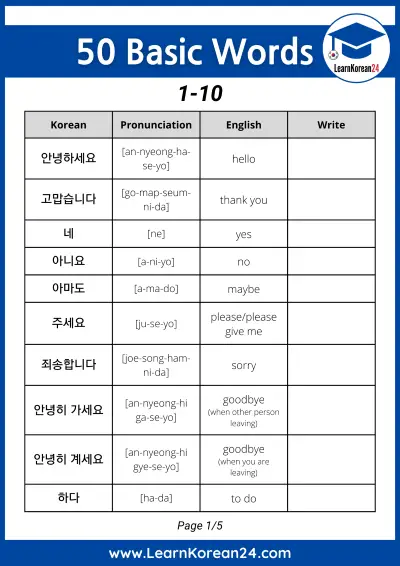
To help you practice and learn these Korean words, you can download and print this PDF for free. Included are 50 basic Korean words with English meaning, romanization, and a space for you to write the word.
Learn More Korean Words
Want to learn more useful Korean words? Check out our Korean vocabulary lists and our Korean phrases to learn lots more Korean words and phrases.
In this post, you will find 50 plus Korean words and phrases that will increase your Korean vocabulary. These Korean words are essential for each language learner as they can increase the chances of having meaningful Korean conversations.
Looking for ways to boost your Korean vocabulary? This post is for you. Here you will find some of the easiest Korean words. You can teach yourself Korean by learning these Korean words and phrases on regular basis. These words will enhance your vocabulary list and enable you to understand Korean writing pieces.
Learning common Korean phrases will enable you to know basic terms related to daily life conversations. Such as greetings, Korean holidays, Korean verbs, conjugating Korean verbs, days of the week and months of the year etc. All these factors are at our fingertips when it comes to English. Learning them in Korean will be fun and a real adventure.
Learning Korean is not as difficult as you think. It is an interesting language. Learning Korean will give a cultural insight and broadens your perspective. If you are looking for a website to learn Korean online, italki is the right direction for you. Here, you will find the most professional and experienced online Korean teachers who will help you build speaking and writing skills. So what you are waiting for? Book your lessons now!
Let us start with some basic Korean greetings to enhance our vocabulary set.
Common Korean greetings
Koreans do not like to mix up with strangers. They are not very outgoing people and do not casually interact with strangers. But they are very welcoming people, especially when they are introduced to new people.
If you are looking for ways to open up to Korean people yourself, be courteous and kind. To do so, you can take the help of the following phrase: 안녕하세요 — “An-nyeong-ha-se-yo” (Hello/Goodbye).
You can learn more about Korean greetings with italki. Here, you will learn the Korean greetings and how the native speakers use them. It lets you have practical exposure with one-to-one learning sessions.
Following are some of the common and easy Korean words that you can learn and use according to your context:
감사합니다 — “Kam-sa-ham-ni-da” (Thank you)
천만에요 — “Chun-mahn-eh-yo” (You’re welcome)
잠시만요 — “Jam-shi-man-yo” (Excuse me)
주세요 — “Ju-se-yo” (Give me)
죄송합니다 — “Chway-seong-ham-ni-da” (I’m sorry)
예 — “Ye” (Yes)
아니요 — “Aniyo” (No)
Due to their nature, Koreans are sometimes considered arrogant. But in reality, they are not arrogant at all. They just socialize a little. It is important for you to understand Korean culture to form your opinion.
Common Korean Questions
Questions are an important part of every language. To ask a question in Korean, it is not necessary to use words like ‘what’, ‘why’, and ‘where’. You can just end your statement on a high note and it will be perceived as a question by the listener.
Just by increasing the pitch, almost any statement can become a question in Korean. For instance, 진짜 (“jinjja”) which means “really” can turn into a question if it is uttered at a high pitch.
Following are some of the Korean question words that you need to know:
누구? — “Noo-goo” (Who?)
뭐? — “Mwo” (What?)
언제? — “Uhn-jae” (When?)
어디? — “Uh-dee” (Where?)
어떻게? — “Uh-dduh-kah” (How?)
왜? — “Weh” (Why?)
어떻게 지내세요? — “Eotteoke jinaeseyo?” (How are you?)
이름이 뭐예요? — “Ireumi mwoyeyo?” (What’s your name?)
어디 출신이세요? — “Eodi chulsiniseyo?” (Where are you from?)
이거 뭐예요? — “Igeo mwoyeyo?” (What’s this?)
뭐라고 했어요? — “Mworago haesseoyo?” (What did you say?)
Find Your Perfect Teacher
At italki, you can find your Korean tutor from all qualified and experienced teachers. Now experience the excellent language learning journey!
Book a trial lesson

Common Korean family words
Korean family structures are a bit conservative. Unlike in America, you cannot use the first name of the mother or father. Now, the Korean culture has started including other cultural values to enrich itself, but still, it has its own values and customs.
Following are some of the common Korean family words:
가족 — “Gajok” (Family)
친척 — “Chincheok” (Relatives)
부모님 — “Boo-mo-nim” (Parents)
아버지 — “A-buh-ji” (Father)
어머니 — “Uh-muh-ni” (Mother)
남편 — “Nampyeon” (Husband)
아내 — “Anae” (Wife)
할아버지 — “Hal-ah-buh-ji” (Grandfather)
할머니 — “Hal-muh-ni” (Grandmother)
삼촌 — “Sam-chon” (Uncle)
고모 — “Sung-mo” (Aunt on father’s side)
이모 — “I-mo” (Aunt on mother’s side)
Common Korean adjectives
Following is the list of common Korean adjectives that can help you to undergo conversation in Korean:
큰 — “Keun” (Big)
작은 — “Jageun” (Small)
늙은 — “Neulgeun” (Old)
새로운 — “Saeloun” (New)
이른 — “Ileun” (Early)
늦은 — “Neujeun” (Late)
긴 — “Gin” (Long)
짧은 — “Jjalbeun” (Short)
좁은 — “Jobeun” (Narrow)
넓은 — “Neolbeun” (Wide)
같은 — “Gateun” (Same)
다른 — “Daleun” (Different)
Find Your Perfect Teacher
At italki, you can find your Korean tutor from all qualified and experienced teachers. Now experience the excellent language learning journey!
Book a trial lesson

Common Korean Verbs
Here are some Korean verbs that are used in daily routine conversations:
먹다 — “Meokda” (Eat)
마시다 — “Masida” (Drink)
자다 — “Jada” (Sleep)
주다 — “Juda” (Give)
가다 — “Gada” (Go)
놀다 — “Nolda” (Play)
누르다 — “Nureuda” (Press)
달리다 — “Dallida” (Run)
쓰다 — “Sseuda” (Write)
읽다 — “Ilgda” (Read)
Korean Numbers
Koreans have two different number systems. Both the number systems are used for different purposes. The following number system is used by the native speakers to count things like ‘one banana’, ‘two apples’, and ‘three oranges’, etc.
Following is the list of first Korean number system:
하나 — “Hana” (1)
둘 — “Dool” (2)
셋 — “Set” (3)
넷 — “Net” (4)
다섯 — “Dasut” (5)
여섯 — “Yusut” (6)
일곱 — “Eelgop” (7)
여덟 — “Yudulb” (8)
아홉 — “Ahop” (9)
열 — “Yul” (10)
The second number system is used for the figures like telephone numbers, dates, and addresses. They are called Sino-Korean numbers.
일 — “Eel” (1)
이 — “Ee” (2)
삼 — “Sam” (3)
사 — “Sa” (4)
오 — “O” (5)
육 — “Yook” (6)
칠 — “Chil” (7)
팔 — “Pal” (8)
구 — “Goo” (9)
십 — “Ship” (10)
Find Your Perfect Teacher
At italki, you can find your Korean tutor from all qualified and experienced teachers. Now experience the excellent language learning journey!
Book a trial lesson

Days of the week in Korean
월요일 — “Wur-yoil” (Monday)
화요일 — “Hwa-yoil” (Tuesday)
수요일 — “Soo-yoil” (Wednesday)
목요일 — “Mog-yoil” (Thursday)
금요일 — “Geum-yoil” (Friday)
토요일 — “To-yoil” (Saturday)
일요일 — “Ee-ryoil” (Sunday)
Months of the year in Korean
월 — “Irwol” (January)
월 — “Iwol” (February)
월 — “Samwol” (March)
월 — “Sawol” (April)
월 — “Owol” (May)
월 — “Yuwol” (June)
월 — “Chirwol” (July)
월 — “Palwol” (August)
월 — “Guwol” (September)
월 — “Siwol” (October)
월 — “Shipilwol” (November)
월 — “Shipiwol” (December)
Find Your Perfect Teacher
At italki, you can find your Korean tutor from all qualified and experienced teachers. Now experience the excellent language learning journey!
Book a trial lesson

Korean colors name
Following is the list of basic Korean colors:
흰색 — “Heuinsaek” (White)
검정색 — “Geomjeongsaek” (Black)
파란색 — “Paransaek” (Blue)
빨간색 — “Bbalgansaek” (Red)
노란색 — “Noransaek” (Yellow)
초록색 — “Choroksaek” (Green)
갈색 — “Galsaek” (Brown)
주황색 — “Juhwangsaek” (Orange)
분홍색 — “Bunhongsaek” (Pink)
보라색 — “Borasaek” (Purple)
Korean Holidays and Celebrations
Following are the official Korean holidays and celebrations:
새해 — “Saehae” (New Year’s Day)
설날 — “Seolnal” (Lunar New Year)
삼일절 — “Samiljeol” (Independence Movement Day)
어린이날 — “Eorininal” (Children’s Day)
부처님 오신 날 — “Bucheonnim Osinnal” (Buddha’s Birthday)
현충일 — “Hyeonchung-il” (Memorial Day)
제헌절 — “Jeheonjeol” (Constitution Day)
광복절 — “Gwangbokjeol” (Liberation Day)
추석 — “Chuseok” (Autumn Eve)
개천절 — “Gaecheonjeol” (National Foundation Day)
한글날 — “Hangeulnal” (Hangul Day)
크리스마스 — “Keuliseumaseu” (Christmas)
Find Your Perfect Teacher
At italki, you can find your Korean tutor from all qualified and experienced teachers. Now experience the excellent language learning journey!
Book a trial lesson

Common Korean Slang phrases
대박 — “Dae-bak” (Awesome!)
콜 — “Kol” (Sure!)
아싸 — “Ah-ssa!” (Yay!)
파이팅 — “Paiting!” (C’mon!)
These were some of the basic Korean words that can help you understand Korean speech and writing. These were a lot of words. You will definitely need time to absorb and memorize them. You can divide these words and memorize like ten (10) words a day.
Conclusion
Learning Korean is easy. You need to understand the Korean culture to use Korean slang and adjectives especially. There are several other Korean words and phrases that are complex and advanced. We recommend you memorize these words and common Korean phrases first and then, move towards the advanced phrases.
Memorize a few words daily. Practice them with the people around you. You can also have practice sessions in front of the mirror. Lastly, you can make flashcards for these words. It will make your learning process easier.
Find Your Perfect Teacher
At italki, you can find your Korean tutor from all qualified and experienced teachers. Now experience the excellent language learning journey!
Book a trial lesson

Looking for ways to boost your Korean vocabulary? This post is for you. Here you will find some of the easiest Korean words. You can teach yourself Korean by learning these Korean words and phrases on regular basis. These words will enhance your vocabulary list and enable you to understand Korean writing pieces.
Learning common Korean phrases will enable you to know basic terms related to daily life conversations. Such as greetings, Korean holidays, Korean verbs, conjugating Korean verbs, days of the week and months of the year etc. All these factors are at our fingertips when it comes to English. Learning them in Korean will be fun and a real adventure.
Learning Korean is not as difficult as you think. It is an interesting language. Learning Korean will give a cultural insight and broadens your perspective. If you are looking for a website to learn Korean online, italki is the right direction for you. Here, you will find the most professional and experienced online Korean teachers who will help you build speaking and writing skills. So what you are waiting for? Book your lessons now!
Let us start with some basic Korean greetings to enhance our vocabulary set.
Common Korean greetings
Koreans do not like to mix up with strangers. They are not very outgoing people and do not casually interact with strangers. But they are very welcoming people, especially when they are introduced to new people.
If you are looking for ways to open up to Korean people yourself, be courteous and kind. To do so, you can take the help of the following phrase: 안녕하세요 — “An-nyeong-ha-se-yo” (Hello/Goodbye).
You can learn more about Korean greetings with italki. Here, you will learn the Korean greetings and how the native speakers use them. It lets you have practical exposure with one-to-one learning sessions.
Following are some of the common and easy Korean words that you can learn and use according to your context:
감사합니다 — “Kam-sa-ham-ni-da” (Thank you)
천만에요 — “Chun-mahn-eh-yo” (You’re welcome)
잠시만요 — “Jam-shi-man-yo” (Excuse me)
주세요 — “Ju-se-yo” (Give me)
죄송합니다 — “Chway-seong-ham-ni-da” (I’m sorry)
예 — “Ye” (Yes)
아니요 — “Aniyo” (No)
Due to their nature, Koreans are sometimes considered arrogant. But in reality, they are not arrogant at all. They just socialize a little. It is important for you to understand Korean culture to form your opinion.
Common Korean Questions
Questions are an important part of every language. To ask a question in Korean, it is not necessary to use words like ‘what’, ‘why’, and ‘where’. You can just end your statement on a high note and it will be perceived as a question by the listener.
Just by increasing the pitch, almost any statement can become a question in Korean. For instance, 진짜 (“jinjja”) which means “really” can turn into a question if it is uttered at a high pitch.
Following are some of the Korean question words that you need to know:
누구? — “Noo-goo” (Who?)
뭐? — “Mwo” (What?)
언제? — “Uhn-jae” (When?)
어디? — “Uh-dee” (Where?)
어떻게? — “Uh-dduh-kah” (How?)
왜? — “Weh” (Why?)
어떻게 지내세요? — “Eotteoke jinaeseyo?” (How are you?)
이름이 뭐예요? — “Ireumi mwoyeyo?” (What’s your name?)
어디 출신이세요? — “Eodi chulsiniseyo?” (Where are you from?)
이거 뭐예요? — “Igeo mwoyeyo?” (What’s this?)
뭐라고 했어요? — “Mworago haesseoyo?” (What did you say?)
Common Korean family words
Korean family structures are a bit conservative. Unlike in America, you cannot use the first name of the mother or father. Now, the Korean culture has started including other cultural values to enrich itself, but still, it has its own values and customs.
Following are some of the common Korean family words:
가족 — “Gajok” (Family)
친척 — “Chincheok” (Relatives)
부모님 — “Boo-mo-nim” (Parents)
아버지 — “A-buh-ji” (Father)
어머니 — “Uh-muh-ni” (Mother)
남편 — “Nampyeon” (Husband)
아내 — “Anae” (Wife)
할아버지 — “Hal-ah-buh-ji” (Grandfather)
할머니 — “Hal-muh-ni” (Grandmother)
삼촌 — “Sam-chon” (Uncle)
고모 — “Sung-mo” (Aunt on father’s side)
이모 — “I-mo” (Aunt on mother’s side)
Common Korean adjectives
Following is the list of common Korean adjectives that can help you to undergo conversation in Korean:
큰 — “Keun” (Big)
작은 — “Jageun” (Small)
늙은 — “Neulgeun” (Old)
새로운 — “Saeloun” (New)
이른 — “Ileun” (Early)
늦은 — “Neujeun” (Late)
긴 — “Gin” (Long)
짧은 — “Jjalbeun” (Short)
좁은 — “Jobeun” (Narrow)
넓은 — “Neolbeun” (Wide)
같은 — “Gateun” (Same)
다른 — “Daleun” (Different)
Common Korean Verbs
Here are some Korean verbs that are used in daily routine conversations:
먹다 — “Meokda” (Eat)
마시다 — “Masida” (Drink)
자다 — “Jada” (Sleep)
주다 — “Juda” (Give)
가다 — “Gada” (Go)
놀다 — “Nolda” (Play)
누르다 — “Nureuda” (Press)
달리다 — “Dallida” (Run)
쓰다 — “Sseuda” (Write)
읽다 — “Ilgda” (Read)
Korean Numbers
Koreans have two different number systems. Both the number systems are used for different purposes. The following number system is used by the native speakers to count things like ‘one banana’, ‘two apples’, and ‘three oranges’, etc.
Following is the list of first Korean number system:
하나 — “Hana” (1)
둘 — “Dool” (2)
셋 — “Set” (3)
넷 — “Net” (4)
다섯 — “Dasut” (5)
여섯 — “Yusut” (6)
일곱 — “Eelgop” (7)
여덟 — “Yudulb” (8)
아홉 — “Ahop” (9)
열 — “Yul” (10)
The second number system is used for the figures like telephone numbers, dates, and addresses. They are called Sino-Korean numbers.
일 — “Eel” (1)
이 — “Ee” (2)
삼 — “Sam” (3)
사 — “Sa” (4)
오 — “O” (5)
육 — “Yook” (6)
칠 — “Chil” (7)
팔 — “Pal” (8)
구 — “Goo” (9)
십 — “Ship” (10)
Days of the week in Korean
월요일 — “Wur-yoil” (Monday)
화요일 — “Hwa-yoil” (Tuesday)
수요일 — “Soo-yoil” (Wednesday)
목요일 — “Mog-yoil” (Thursday)
금요일 — “Geum-yoil” (Friday)
토요일 — “To-yoil” (Saturday)
일요일 — “Ee-ryoil” (Sunday)
Months of the year in Korean
월 — “Irwol” (January)
월 — “Iwol” (February)
월 — “Samwol” (March)
월 — “Sawol” (April)
월 — “Owol” (May)
월 — “Yuwol” (June)
월 — “Chirwol” (July)
월 — “Palwol” (August)
월 — “Guwol” (September)
월 — “Siwol” (October)
월 — “Shipilwol” (November)
월 — “Shipiwol” (December)
Korean colors name
Following is the list of basic Korean colors:
흰색 — “Heuinsaek” (White)
검정색 — “Geomjeongsaek” (Black)
파란색 — “Paransaek” (Blue)
빨간색 — “Bbalgansaek” (Red)
노란색 — “Noransaek” (Yellow)
초록색 — “Choroksaek” (Green)
갈색 — “Galsaek” (Brown)
주황색 — “Juhwangsaek” (Orange)
분홍색 — “Bunhongsaek” (Pink)
보라색 — “Borasaek” (Purple)
Korean Holidays and Celebrations
Following are the official Korean holidays and celebrations:
새해 — “Saehae” (New Year’s Day)
설날 — “Seolnal” (Lunar New Year)
삼일절 — “Samiljeol” (Independence Movement Day)
어린이날 — “Eorininal” (Children’s Day)
부처님 오신 날 — “Bucheonnim Osinnal” (Buddha’s Birthday)
현충일 — “Hyeonchung-il” (Memorial Day)
제헌절 — “Jeheonjeol” (Constitution Day)
광복절 — “Gwangbokjeol” (Liberation Day)
추석 — “Chuseok” (Autumn Eve)
개천절 — “Gaecheonjeol” (National Foundation Day)
한글날 — “Hangeulnal” (Hangul Day)
크리스마스 — “Keuliseumaseu” (Christmas)
Common Korean Slang phrases
대박 — “Dae-bak” (Awesome!)
콜 — “Kol” (Sure!)
아싸 — “Ah-ssa!” (Yay!)
파이팅 — “Paiting!” (C’mon!)
These were some of the basic Korean words that can help you understand Korean speech and writing. These were a lot of words. You will definitely need time to absorb and memorize them. You can divide these words and memorize like ten (10) words a day.
Conclusion
Learning Korean is easy. You need to understand the Korean culture to use Korean slang and adjectives especially. There are several other Korean words and phrases that are complex and advanced. We recommend you memorize these words and common Korean phrases first and then, move towards the advanced phrases.
Memorize a few words daily. Practice them with the people around you. You can also have practice sessions in front of the mirror. Lastly, you can make flashcards for these words. It will make your learning process easier.
Want to learn a language at italki?
Here are the best resources for you!

